
Issue 139 Term 3 | 2023 Assisting Resilience Natural Disasters The ongoing battle against bullying ISSN 1170-4071 Principal | Careers Advisers | HODs | Administration Dept | Board of Trustees | Property Manager | Outdoor Ed Dept | Teachers HAVE THE FOLLOWING PEOPLE SEEN THIS? Helping children and ākonga hold external pressures at bay Push and shove Taking action to combat climate change ON THE MOVE Including everyone in physical activity Fun themes for your canteen Sustainable hot water and heating solutions ONLINE
Encouraging sports and recreation in our schools

TigerTurf New Zealand Ltd
It’s about focus, drive, and determination, feeling exhilarated, feeling deflated, wanting more, wanting to be better, wanting to be the best.
With a range of flexible options to suit any school’s requirements, TigerTurf is your perfect sporting partner.





Sports and recreation is high on the curriculum, teaching new skills, to be active, about health and fitness. Sport teaches strategy and planning, about being a team player, it exposes children to winning and whatever the sport, whatever the weather, TigerTurf’s versatile synthetic turf sports surfaces are the best place to play.
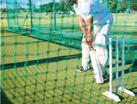
Providing the best possible sports facilities will inspire students, with the passion to participate in outdoor activities and encourage them to keep coming back. TigerTurf’s synthetic turf surfaces are the perfect foundation on which to develop the passion, the skills, the talents of tomorrow’s athletes.
Freephone 0800 804 134 // NZinfo@tigerturf.com // tigerturf.com

FOR OVER 40 YEARS



Our brokers speak fluent insurance Get your school’s insurance sorted 0800 276 624 crombielockwood.co.nz We’ve been protecting schools like yours for over 25 years CL1033B
Publishers note


This issue of Principal’s Today kicks off looking at how to survive the mid-year blues, discussing how to lay a platform for success that is simultaneously productive, energising and sustainable. We also look at how to help children and ākonga hold external pressures at bay, discuss the ongoing battle against bullying, and ask whether students are being taught all they need to know regarding sex education.

There are pieces on sustainable hot water and heating solutions, including everyone in physical activity, taking action to combat climate change, and some fun themes for your canteen, plus much more. Enjoy!

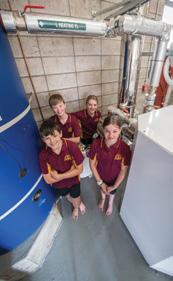

Academy Group has grown to be one of New Zealand’s largest privately owned publishing houses, with carefully targeted publications offering in-depth analysis of current issues, exciting profiles, interesting people, and details of the latest projects and products making news.

This publication is provided on the basis that AMark Publishing NZ Ltd is not responsible for the results of any actions taken on the basis of information in these articles, nor for any error or omission from these articles and that the firm is not hereby engaged in rendering advice or services. AMark Publishing NZ Ltd expressly disclaim all and any liability and responsibility to any person in respect of anything and of the consequences of anything done, or omitted to be done, by any such a person in reliance, whether wholly or partially upon the whole or any part of the contents of this publication. Advertising feature articles are classified as advertising content and as such, information contained in them is subject to the Advertising Standards Authority Codes of Practice. Contents Copyright 2013 by AMark Publishing NZ Ltd. All rights reserved. No article or advertisement may be reproduced without written permission.
Conditions of entry: One entry only per person and must be sent on the official entry form or as otherwise stated. Entry is free and open to all residents of New Zealand. All entrants must be over the age of 18, proof of identity and date of birth may be requested. Employees and their immediate families of Academy Group, the promoter and agencies associated with any promotion in this publication are ineligible to enter. Winner(s) will be notified by email/phone. The judges’ decision is final, no correspondence will be entered into. No responsibility is accepted for late, lost or misdirected mail.
Prizes are not transferable or redeemable for cash. Academy Group, the promoter and agencies associated with any promotion in this publication shall not be liable for any loss or damage whatsoever suffered (including but not limited to direct or consequential loss) or personal injury suffered or sustained, during the course of prize winning travel or in connection with any other prizes won. Academy Group, the promoter and agencies associated with any promotion in this publication accept no responsibility for health, luggage, insurances, travel, personal expenses and transfers other than specified. Entries remain the property of Academy Group, the promoter and agencies associated with any promotion in this publication and cannot be returned. Academy Group, the promoter and agencies associated with any promotion in this publication reserves the right to photograph and publish winners. Entries may be used for further marketing purposes by Academy Group, the promoter and agencies associated with any promotion in this publication but are not made available to any third party.
4 | Term 3, 2023 MAGAZINES TODAY OVERVIEW
HEAD OFFICE AUCKLAND OFFICE 38 Lowe St Addington Christchurch 8011 (03) 961 5050 admin@academygroup.co.nz www.principalstoday.co.nz MAGAZINES TODAY MANAGEMENT Gary Collins MANAGING DIRECTOR Kylie Palermo GENERAL MANAGER OF OPERATIONS Monice Kruger CHRISTCHURCH SALES MANAGER Jonathon Taylor EDITOR Jarred Shakespeare ART DIRECTOR PRINTER IDEAS 8 How to survive the mid-year blues Build a not-so-secret agency 12 Building diverse values Alexandra Primary School principal Fiona Mackley shares her experiences 14 Assisting resilience Helping children and ākonga hold external pressures at bay News 15 Minimising physical restraints The new rules regarding physical restraints 16 Push and shove The ongoing battle against bullying 17 NCEA rollout changes announced The curriculum changes being pushed back 18 Sex education Are ākonga learning all they need to know? 19 Balancing acts Staff-student ratios 20 Private vs public In search of equal opportunities 21 Breaking down boundaries Benefiting Māori people in education 24 On the move Including everyone in physical activity
& Learning 30 Smart moves Samsung’s Solve for Tomorrow competition is full STEAM ahead 34 Aiding education Learning via innovative technology 36 Being proactive Making reading fun is the key to improving literacy Editor 38 Natural disasters Taking action to combat climate change 46 EOTC Finding the right spot for you 54 School sports How activity hits all the right notes 56 Youth vaping How schools can respond 60 Serving up the good stuff Fun themes for your canteen 64 Water worlds Seeking understanding of our oceans 74 Power points Sustainable hot water and heating solutions
Working
20 47 08 74
16 This publication is printed on papers supplied by All wood originates from sustainably managed forests or waste sources. All mills utilise the Chain of Custody system to verify fibre source. The end product is recyclable. All mills are ISO 14001 certified.
ISSN 0113-8340 (Print) | ISSN 2230-6331 (Online)
SUCCESS IS OUR BUSINESS
6, 3-13Shortland St Auckland
1010
FOR ALL ADVERTISING ENQUIRERS Contact the sales team on (03) 961 5083 | sales@academygroup.co.nz
YOUR
Level
CBD Auckland
LEARNING GOALS


“We love the flip-out learning supports, and the line size in all books, as well as the space for reflection at the end. Love the relatableness of the NZ theme. The students enjoyed talking to each other about the different supports provided in the books.” - Abbey C





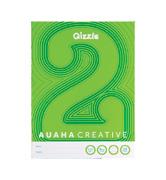










“I love that the books are robust enough to withstand new entrant learners. They’re also great as they can easily paste an A4 sheet into the books, even when they are just learning how to line the sheet up with the page. The pages are thick and the books don’t fall apart when lots of pages have been glued in.” – Kendra F

MATHS HANDY Place Value Houses Wha! 5 4 8 2 3 4 1 I am able to: am learning to: Teacher: Teacher: Date: Date: LEARNING GOALS pencil to goals MATHS CHIT CHAT My t egy i My s egy s si ila /dif er t because I ld like evise my think ng can prove y hink ng by hea d y say th ould lik o add g ee be dis g ee bec e Can y expla ? I can connect o this because What hea d you say w s… I th correc ? do t der t d I know y nswer is orrec because I m su e abou Can y epeat th or m ? Can you gi e me ample so can und tand? Ano he y to think idea s.. An he st a gy is wa t add th t idea I would k o build what said Wh you said es m think What heard is So you aying ag ee with b use My st a egy is like you b ause Thi eminds me f disag ee with beca This is just like Why did y se tha st egy? H w did you ? wonde why ? like h you said abou b y idea, I hink gy think w y Becausethey re 360degrees! Why ar rcles hot? KIWI CHOICE premium exercise books Call us today to get a free sample! 0800 600 123, or email customerservice@qizzle.co.nz Built to last! Super strong 350gsm cover with 4 staples in the spine! Te reo Maori on front cover promotes everyday use of Te reo Maori.Aligned with NZ curriculum Fully laminated cover can be used as a whiteboard A4+ (230 x 315mm) size means activities and worksheets don’t need to be trimmed before they are glued in. HAMISH 100% KIWI owneD MADE FOR KIWI KIDS DESIGNED BY KIWI TEACHERS SUPER STRONG COVER aligned with nz curriculum yellowhead / mohua zip nihokati Ng ngeru / cat Wh whare house Aa apple / poro Bb bush ngahere Cc cloud kapua Dd dog kurī Ee egg / hua Ff fantail pīwakawaka Gg gumboots kamupūtu Hh hand / ringaringa Kk kiwi kiwi Ll lemon rēmana Mm morepork / ruru Nn New Zealand Aotearoa Oo octopus wheke Pp pukeko pūkeko Qq queen kuīni Rr river / Ssseagull/karoro Tt togs kākahu kaukau Uu umbrella hamarama Vv volcano puia Ww watch karaka Xx x-ray whakaata roto Yy Zz Ii insect / pepeke Jjjandals haenarawaewae I am able to: am learning to: Teacher: Teacher: Date: Date: I Believe in you!
cr crown sheep ee feet You’re a star! fr fruit prprincess sl slide str strawberry splsplash book oo shampoo oa boat wr write aw paw autumn window wh wheel Use penciltowriteyourgoals
Lincoln University scholarships fostering a wide range of talent.
A Lincoln University Sports Scholarship is helping Arlya Guard, a netball goal shoot, keep on target.
“Following my selection into the development National Netball League (NNL) squad in January I’ve been training hard, as I aim to make the team for 2024,” Arlya said. “The sport facilities, resources and connections I have got through the scholarship programme here at Lincoln have been amazing, with a personal trainer, nutritionist and a doctor.”
Arlya is playing for Lincoln University B, which was promoted to the Christchurch premier competition this year.

“I have loved the sporting opportunities which I have been provided with even in this short period of 2023 so far.
The Bachelor of Land and Property Management student said Lincoln University provided the best of both worlds, with independence and university experience, and a focus on a mixture of academics and sport.
Applications for Lincoln University scholarships are now open and need to be in before 15 August.
Sports scholarships, which offer up to $6,000 per annum towards tuition fees (or accommodation costs in their first year of study with fees free) cover rugby, hockey, basketball, netball, rowing, and elite sports, which includes athletics, martial arts and a range of other codes, and on occasion even referees.
But it’s not all about sport.
Future Leader Scholarships do what the name says- grow leaders, both here in Aotearoa New Zealand and internationally, and the recipients become part of a mentored cohort which undertake projects that benefit the community and their fellow students. Again they benefit from $6,000 a year towards tuition fees, or accommodation costs in their first year of study.
The Tihi Kahuraki Scholarship is Lincoln’s premier scholarship for Māori. It can be translated as “being at the pinnacle or summit” and features tailored mentoring throughout the study period.
It provides up to $19,000 per year to cover on-campus accommodation costs and tuition fees for three years of study.
The Pasifika Excellence Scholarship supports Pasifika students entering their first year of undergraduate study who show strong leadership and engagement in their community. It is worth up to $19,000 per year to contribute towards oncampus accommodation costs and tuition fees for three years of study.
Lincoln also has the ViceChancellor’s Scholarship for Excellence, offered to students of high academic calibre. To qualify they must have gained NCEA level 1 and 2 with Excellence endorsement (or equivalent). It offers $6,000 towards tuition fees plus $4,000 towards living expenses during the duration of a degree, whilst maintaining a B+ average.
In addition, Lincoln also has eight other scholarships specifically for Māori and Pasifika students over a range of subject choices. These have an equivalent value of at least $5000.
The scholarships help students across the range of programmes at Lincoln, from agriculture to tourism and science, to be able to concentrate on their studies by providing financial assistance and support such as from Te Manutaki, the University’s Māori and Pasifika team, and to grow.
You can find out more, or apply for a scholarship, at www.lincoln.ac.nz/scholarships
6 | Term 3, 2023
Our flagship scholarship options include;
• Tihi Kahuraki Scholarship

• Pasifika Excellence Scholarship
• Vice-Chancellor’s Scholarship for Excellence
• Future Leader Scholarship


• Sports Scholarship
• As well as a range of scholarships specifically for Māori and Pasifika tauira.


Applications close 15 August
Learn more and apply now at www.lincoln.ac.nz/scholarships
How to survive the mid-year blues Build a not-so-secret agency
By Rob Clarke
It’s that time of year again. Term 3… the holidays are over, things are looking good, and then along comes winter and with it, the realisation that there’s still lots of work to get through as your school year gets into full swing.

With the flu and all the various colds, bugs and inevitable staff absences that come with the season, not to mention the sheer scope of new initiatives there are to deal with, it can be a big ask to keep spirits and motivation high, and momentum going.
If you take a look at what’s coming up, what projects have you already got on the go? Who is up with the play on how these will progress, and do you have a back-up plan for any time critical tasks? If not, and you’re wondering ‘what if’, then it’s probably a good time to look at how you can set your staff up for success in a way that is simultaneously productive, energising and sustainable.
Sustaining momentum

When the energy’s low and there are absences in the team, how you enable your leaders and how they in turn enable others, can be
the difference between struggle and success.
You know that when teachers are genuinely excited about what they’re teaching and learning, they’re typically more creative and engaged. But if they’re to generate and sustain this excitement and creativity at any time, (including Term 3) requires you to provide the necessary tools, skills and environment. Often what motivates people to keep going is in knowing that they are trusted to get on with the job, have a clear idea of what’s needed and expected, plus the necessary agency to make things happen.

Building self-awareness and trust

Some people naturally take ownership of their situation, but not everyone feels the same sense of agency.
By Rob Clarke CEO of Learning Architects
Have you ever noticed that some people have the ability to do what needs to be done, but lack the confidence to take action? For example, a new staff member is taking the lead in planning a new unit of work for their team, and even though you know they have the ability, they seem hesitant to share their ideas in the team meeting; their confidence may not be where it needs to be. Perhaps they lack trust in their ability to do things, or maybe they are simply unsure if they are allowed to take action.
As much as we love to hate them, meetings provide a useful situation to observe the level of
agency people have. Regardless of topic or number of people present, keep an eye out for the extent that everyone’s ideas are heard or voiced.
Do meetings facilitate discussions and ideas that involve everyone in creating a shared plan? Is there ample opportunity for those less likely to speak up to contribute in other ways? Perhaps this is done before or after the meeting for those individuals, or there’s a written feedback mechanism. Make sure there is some way everyone can confidently contribute.
Having confidence to take action starts with you
The level of trust and agency felt throughout your school begins with you. You’ll know from personal experience that having a trusting, supportive Board gives you confidence to take action and is an important factor in your ability to be an effective leader.
It stands to reason then, that the level of trust and agency you provide your leaders is an important factor in how confident they feel to perform their roles in a way that energises
8 | Term 3, 2023 News | Inside Education
NZ’S 5-STAR RATED PLAYGROUND SURFACING


SAFETY CONFIDENT
We are so devoted to ensuring supreme quality and safety that we have spent 15 years perfecting our grinder that produces our wood chip so that it removes all traces of nails, staples and hazardous metals/materials, and has no “sharp edges”. Since safety is paramountwe implement an extensive testing regime every two to three years, evaluating the impact efficiency of the wood chips being produced.

EXTENSIVE RESEARCH
2 years of product development before launch
RIGOROUS TESTING
3 years testing of Cushionfall by 3 councils in 5 playgrounds before council approval


ONGOING QUALITY TESTING
More than 50 tests in the last 10 years alone!
HIGHEST IMPACT TESTS
In Australasia achieved
PREFERRED CHOICE
Councils, the Ministry of Education, Kindergarten Associations, Play Centre Associations and Preschool Centres

Manufactured exclusively by Reharvest Timber Products LTD Phone: 09 299 3999 / 0275 299 399 | Email: info@reharvest.co.nz
www.reharvest.co.nz
them, while still meeting the goals of your annual plan and overall vision; and so on, flowing through your school to all of the staff and ultimately your students.
The OECD defines student agency as the capacity to set a goal, reflect and act responsibly to effect change. It is about acting rather than being acted upon; shaping rather than being shaped; and making responsible decisions and choices rather than accepting those determined by others. When students are agents in their learning, that is, when they play an active role in deciding what and how they will learn, they tend to show greater motivation to learn and are more likely to define objectives for their learning.

This same premise applies to adults as much as tamariki. Knowing they have agency generally gives people confidence that they have the necessary understanding and skill to take action.
Cultivate common ground
When leaders are clear about the outcomes they seek and what success looks like, it is easier for others to follow and replicate. Having this clarity makes it easier for everyone to figure out what practices and skills are required to achieve success.
Exploring ideas and clarifying shared beliefs enables people to approach problems from a common understanding; it creates a common ground for solutions and practices which enable your team to more easily move in the same direction together.
Here are some ways to develop shared beliefs and create common ground:
1. Encourage your leaders to link conversations about student learning to your school vision and values. This helps staff to relate to Ministry changes such as implementing Te Mātaiaho.
2. Involve leaders at all levels in school self-review processes.
3. Encourage leaders to occasionally check in with staff about their beliefs that underpin teaching decisions.
Provide clear parameters and relevant frameworks
Giving people agency is not about unleashing a free for all for everyone. Setting parameters is an important piece of the puzzle if you are to succeed in bringing things together.
At a basic level, making sure staff are familiar with the latest requirements, and are working within these is paramount (for example using the EOTC template when assessing risk). Making sure that they are is primarily up to you and your leadership team, but with agency of course comes individual responsibility so it’s important that everyone is aware of systems and processes.
In terms of teaching and learning, the ‘Understand, Know, Do’ framework outlined in the refresh of the NZC / Te Mātaiaho, provides a common approach in that it gives each learning area a clear structure to guide how we design programmes for students to engage, and in which there are a number of elements that will help teachers anchor their practice.
If everyone keeps this framework in mind as they design learning, it will generate a shared understanding and clarity of what students need to learn across the school. Also, as the breadth of ideas changes at different year levels, it can bring excitement about possibilities and a positive sense that ‘we are all moving in the same direction’.
Conversations that build agency
Having regular, meaningful conversations can influence the level of agency felt in your school; keep all lines of communication open, active and clear.
There are a few types of conversations that will hopefully occur. Conversations that:
• Help people connect with one another
• Enable people to feel heard and valued
• Keep people informed and up to speed
• Celebrate progress, as well as success
• Explore possibilities and new ideas
• Support people to deal with issues, for example issues relating to performance as well as issues relating to professional behaviour.
Some may be obvious and you’re aware that they’re happening; others might not be, often because they are too challenging for some people to contemplate. Perhaps they are unsure of how to approach the conversation, where to start, what to say; or are worried how it will be taken by the other party. And so,
instead of having that important feedback conversation, they procrastinate or ignore what really needs to be addressed.
Ways to strengthen agency
Here are some ideas should you recognise areas where you’d like to strengthen agency in your school:
1. Encourage everyone to share the purpose behind decisions, linking this to the strategic plan.
2. When people meet, try to build in an activity where they get to know one another in some way.
3. Encourage staff to uncover what motivates and interests each other.
4. Intentionally develop a conversational culture; check staff have safe and appropriate skills, channels and ability to give and receive feedback to one another - this creates opportunities for relationships to continually improve.
5 When staff come to you with problems, ask them to also bring a solution. This provides an opportunity for them to offer ideas, and increases confidence.
6. Spend regular time helping staff explore and understand their strengths and weaknesses, especially in relation to their aspirations and professional goals.
7. Check people are able to make the decisions they need to be successful in their role. Ask them in what ways would they like to have more decisionmaking authority; this act in itself may very well build trust.
10 | Term 3, 2023
News | Inside Education
When leaders are clear about the outcomes they seek and what success looks like, it is easier for others to follow and replicate. Having this clarity makes it easier for everyone to figure out what practices and skills are required to achieve success.

Capture
Pūkenga
now for 2024
Kapohia tō moemoeā
your future with a degree at UCOL Te
Enrol
ucol.ac.nz
Building diverse Values
By Timmi Aplin-Barrett
Fiona Mackley has been the principal for Alexandra Primary School since late 2020 and shares her experience.


What brought you to Alexandra Primary School?
Originally, I worked in a jobshare position which was ideal for a new mum as my colleague and I also looked after each other’s children while the other was working - the perfect arrangement. I loved the family atmosphere of Alexandra Primary School, as well as the size. It was easy to know every child, family and staff member in the school.
How do you incorporate the deeper Māori interpretations of the school values (Respect, Responsibility and Ready to Learn) into every day school life?
We make a lot of effort to notice and acknowledge when we see our school values in action. Through our PB4L school wide system we award paper tokens and note which value/s the recipient has demonstrated. We also have special goldcoloured tokens for the students who consistently demonstrate our values.
What do you enjoy most about being the principal of Alexandra Primary School?
I really enjoy having the chance to connect with our amazing and unique ākonga. I get to do this while I am on duty, as I visit classrooms and also when I get the opportunity to teach. I also love working closely with our outstanding kaiako and kaiāwhina. They are a truly passionate bunch of educators who have their learners’ best interests at heart.
What are some moments you’re proud of as the principal?
Most of my proud moments are linked to our school’s strong connection with our community. Any chance we get to learn in
our local area alongside experts results in really deep learning that we know our ākonga will remember forever.
Some examples of late are Year 4 tamariki working with the Alexandra Clyde RSA to make ceramic poppies to place on restored headstones of returned service members, Year 6-8 students working with a graphic designer to design a new school
logo based on our cultural narrative and school history, and our neurodiverse ākonga designing and constructing a sensory garden linked to our Creative in Schools project which is led by our SENCo, Lisa Foggin.
What are some challenges you and the school have overcome?
One challenge we have had at APS for many years is not having
a hall space where we can all come together for assemblies and other special events. We are finally working our way through the design process for an amazing MPLE which will have the capacity to hold all of our ākonga and staff.
It will also have a kitchen which we can use for ‘Feed Our Whānau’. This initiative started after the first lockdown of 2020. Our school vegetable garden had continued to grow over the lockdown period so on our return to school we had a free burger lunch, using lettuce, tomatoes and carrots.
A library will be a popular addition to the MPLE. Currently we use the Alexandra Library. We don’t see this as a challenge but an excellent opportunity to make use of our local amenities.
Diversity is a big part of Alexandra Primary School –how do you ensure it remains a core value?
Diversity is a core component of our school vision “Deep learning in a safe and diverse environment where everyone belongs”. Ensuring that all of our ākonga are recognised and celebrated for their many strengths is part of our school culture.
We are also passionate about te ao Māori and we feel lucky to have strong support from our Māori whānau and local kaumatua. We are building our capabilities in weaving te ao Māori into our daily school life.
We love how our school roll is growing in cultural diversity too, with many families arriving to Alexandra from other countries. It is a privilege to learn more about our new students’ cultures and ensure they feel a sense of belonging.
12 | Term 2, 2023 Interview | Principal Q&A
Alexandra Primary School principal, Fiona Mackley.
Most of my proud moments are linked to our school’s strong connection with our community. Any chance we get to learn in our local area alongside experts results in really deep learning that we know our ākonga will remember forever.




Slash Your Storage Costs!!! Save Thousands $$$ Looking for Sliding Storage Systems? for a quote!! Ex Hire Lundia & Hydestor Systems Now Selling Up to 60% off retail Near New-Lundia-Sliding & Static Shelving NOW Admin Furniture available 60% cheaper than new Call Mike today Ph 0800 42 42 47 Email: advancehire@xtra.co.nz SHELVING SOLUTIONS – Auckland • Wellington • Christchurch • All areas Serviced www.advancehire.co.nz / www.shelvingsolutions.co.nz / www.cabrafurniture.co.nz
Assisting resilience
By Timmi Aplin-Barrett
The catchphrases “unprecedented times” and “once in a hundred years” are fairly commonplace these days thanks to events such as Covid-19 and Cyclone Gabrielle, among many others.
While many people are feeling the effects of such events, it’s important to remember that children and ākonga – while very resilient – cannot resist continued pressure on their own. Ministry of Education Hautū (Leader) Operations and Integration, Sean Teddy, says they’re always available to provide advice, support and guidance to schools when it’s needed.
“Each day, our Te Mahau (regional) offices assist with a wide range of requests for help from schools. As schools are crown entities and therefor selfgoverning, it’s up to them how they use these resources to best support ākonga,” he says.
The ministry can provide day to day assistance to schools
who ask for help, they can also provide specific expertise and guidance to assist with managing the aftermath of unprecedented events or incidents affecting akonga. Incidents such as the Covid-19 pandemic with schools needing to close down, and the recent flooding events in the North Island.
“After the severe weather events this year, we provided guidance to enable teachers to support their students social and emotional wellbeing as they returned to school,” Sean says.
“We also provided a resource, aligned to the material used by the psychosocial national response, to help teachers support tamariki impacted by severe weather events.”

Sean says they pass on resources developed by other agencies, such as information from the Ministry of Health providing mental health advice for coping after a traumatic event.
In Hawke’s Bay and Tairāwhiti, the Counselling in Schools initiative provided local community counselling support for ākonga, and to support the care efforts of
kaiako and kaiāwhina. Initiatives such as Mana Ake, provided by the Ministry of Health, are also available to schools in some regions. Mana Ake provides support to students in year one to eight, promoting wellbeing and positive mental health.
“A number of initiatives to support tamariki have been initiated and funded to support students whose learning has been disrupted by the Covid-19 pandemic. For schools who received disability support for students, we engaged an organisation to provide behavior support services during the Covid-19 pandemic.
“This support is still available. Our traumatic incident team is on hand to help schools who are recovering from a distressing or upsetting event such as during or after lockdown events,” Sean says.
Sean explains that traumatic incident teams can help with a wide range of things.
They can help schools develop appropriate processes for dealing with an incident to ensure the safety and wellbeing of their ākonga and staff, and to return
the ECE center/school to normal operations as quickly as possible, and help schools understand the emotional and psychological impacts of a traumatic incident and the effects such impacts can have on how people behave.
Traumatic incident teams can also advise on what schools can do to support those who have been involved in a traumatic incident and advise schools on how to communicate about the incident appropriately with their children/young people, staff, parents and the community. Looking after ākonga during times of distress is vital. Their homes, schools and many other aspects of their lives can be impacted during significant events. While children do have the unique ability to “bounce back” from disaster, it’s important to understand what assistance schools and kura can use to ensure their ākonga are okay.
Schools and kura can visit www.manaake.health.nz, www.health.govt.nz and www.education.govt.nz for more information.
14 | Term 3, 2023 News | Supporting Students
Minimising physical restraints - an update
By Timmi Aplin Barrett
The Ministry of Education is urging school staff to ensure they’re up to date with training and new rules regarding physical restraints.
Earlier this year, they announced new guidelines designed to minimise the use of physical restraints in schools and kura.
Ministry of Education Hautū Operations and Integration, Sean Teddy, says the rules and guidelines have a strong focus on prevention.
“The guidelines outline the legislation and set out a practical approach to recognize and understand distress, focusing on minimising the use of physical restraints in
schools. This includes the use of unjustified physical restraint.
“The legislation also states that there may be times when proactive steps are needed to ensure ākonga safety. For example; an unauthorized staff member reaching out to prevent ākonga from running onto a road or climbing somewhere that is unsafe,” Sean explains.
All registered schools should already have a physical restraint policy in place and are now being reminded that all primary and secondary teachers and authorised staff must complete the online learning module – Physical RestraintUnderstanding the Rules and Guidelines – by February, 2024.

Ministry of Education Communications Lead, Anna Aitchison, says so far, more than 12,000 school staff have completed the module.
“The feedback has been overwhelmingly positive, with
more than 90 percent of people giving the module a four- or fivestar rating. It’s a useful module which introduces the new rules and guidelines and explains how to apply them in your role.”
Ākonga and Communities
general manager, Maree Jeurissen, says she thinks everyone who completes the module will take something valuable away from it.
“Schools told us they wanted more clarity on acceptable physical contact in schools and that they wanted practical advice on how to prevent ākonga distress before it escalates. The guidelines do that and the online module is a simple way of showing us how,” she says.
Maree says some of the excellent feedback received about the module are around its ability to simplify some quite complex legal terms into practical advice for a school setting.
Back to School #hereforgood
We know that Back to School can be a challenging time for many. So this year, we’re supporting schools with equitable learning outcomes.
Sign up for Back to School stationery, and you’ll receive gift cards* to help more of your students get set up for 2024. You may even want to stock up the classroom so teachers have all they need to support learning. It’s up to you how you spend them - we just want to make sure your Back to School is the best one yet.
*For every five students on your school roll, you’ll get 1x $20 Warehouse Stationery gift card. That means if you’ve got 1,000 students, you’ll receive $4,000 in gift cards! To get started contact schools@stationery.co.nz


Term 3, 2023 | 15 News | Life in the Classroom
Push and shove
The ongoing battle against bullying
By Natasha Parrant
School bullying is still very prevalent at schools in Aotearoa - but what’s being done to prevent bullying from rising in numbers, so it doesn’t get worse?
According to Education Counts New Zealand, a 2021 report written by Mercy Mhuru from the Ministry of Education states that the country has the highest rates of bullying globally.
About 36 percent of Year 5 and 38 percent of Year 9 students surveyed in The Progress in International Reading Literacy Study and The Trends in International Mathematics and Science Study who stated they were bullied every month.
About 33 percent of 15-year-old students in the country reported they haven’t been bullied.
Bullying comes in many different forms, it can be exclusion, being made fun of, or being assaulted physically or verbally, and it can lead to major mental health issues for tamariki.
The report also found the students who have experienced bullying often decreases as they get older.
Students who get picked on are more likely to be
male, disabled, LGBTQIA+ (particularly transgender), low performers, and come from an underprivileged background, as stated in Education Counts’ key findings.
Mental Health Foundation of New Zealand chief executive Shaun Robinson says bullying in Aotearoa is a huge issue.
“We have the third-highest rate of school bullying out of 36 OECD countries. Rainbow (LGBTQIA+) students face even higher rates of bullying.
“The kaupapa of Pink Shirt Day began in the school setting, it started in Canada in 2007 after two students stood up for another student who was bullied for wearing pink and Aotearoa has been celebrating Pink Shirt Day since 2009.
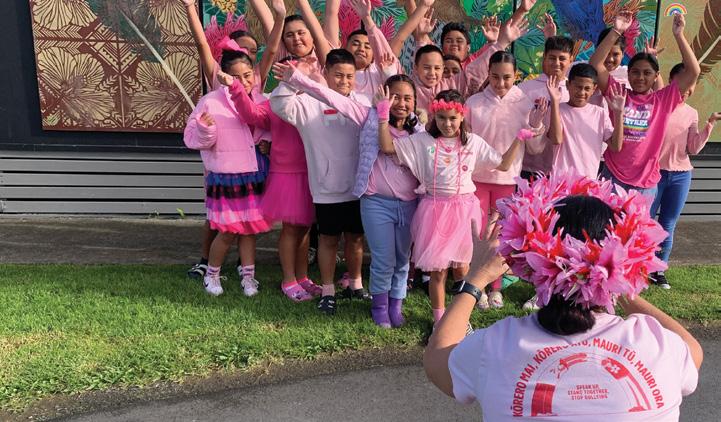
“Wearing a pink t-shirt makes a powerful statement. It shows others that you’re committed to being an everyday upstander and taking a stand against bullying all year round. It’s a way of showing those who are being bullied that they aren’t alone, and you stand with them.”
Schools can help prevent school bullying by including details about Pink Shirt Day/bullying prevention in the curriculum before and after Pink Shirt Day.
InsideOUT is a charity that aims to provide support for the rainbow youth in Aotearoa, so they feel safe and welcomed in their schools and communities –visit: www.insideout.org.nz.
In collaboration with the Mental Health Foundation and funded by Southern Cross, Pause Breathe Smile is a mental health programme for tamariki aged five to 12. Teacher training is funded for primary and intermediate schools.
“The programme has shown significant increases in positive behaviour and wellbeing and reductions in negative behaviour.”
He also advises it’s important for schools to have an antibullying policy and for kura or school whānau to understand it.
“Promote the policy in newsletters and on the school website. Keep bullying prevention front of mind Our Good Reads page includes book reviews on topics like anxiety, bullying and resiliency.
“These books have been reviewed by teachers, school counsellors, librarians, health professionals, parents, and rangatahi. Speak about the books in class and encourage tauira to read them.”
Schools can also use tools such as the Wellbeing@School survey to collect data regarding how tauira feel about their experiences of being bullied at school.
Over time, schools should conduct the survey again and compare the results to see the progress. As well as use resources like the relationships and sexuality education and mental health education guides to prioritise student wellbeing, Shaun says.
InCommon’s tamariki quiz activity gets tamariki to see what they have in common with one another, even with those they think are different from them. Tauria can download the In Common’s quiz and give it a go, he says.
There are many resources on the website, such as toolkits for teachers and akonga to use: pinkshirtday.org.nz
pinkshirtday.org.nz/books
pinkshirtday.org.nz/prevention/ explained pinkshirtday.org.nz/prevention/ being-bullied
pinkshirtday.org.nz/resources/ about-bullying
16 | Term 3, 2023 News | Behaviour
Photos kindly supplied by Mental Health Foundation of New Zealand.
Bairds Mainfreight School wears pink for Pink Shirt Day to spread awareness around school bullying.
NCEA rollout changes announced
 By June Pfister
By June Pfister
The National Certificate of Educational Achievement (NCEA) has been the main educational qualification in New Zealand since 2002.

Students from Years 11 to 13 work through their last three years of high school to achieve NCEA to allow easier access to study through university or tertiary education.
In February 2020, it was announced that NCEA would change some of its processes in secondary schools.
In April 2023, Education Minister Jan Tinetti announced that the

NCEA changes would be slowed down due to prioritising new maths, literacy, te reo Māori and pāngarau assessments.
All school leavers with NCEA will be required to have minimum maths and literacy skills, with a new assessment being introduced from the start of next year.
Education Minister Jan Tinetti says, “As Minister of Education, my bottom line is to ensure
our young people are getting the education they need and deserve. This includes giving students, along with their parents and employers, confidence that they are leaving school with a strong foundation in maths and literacy”. This means due to the focus on implementing the new curriculum in maths, literacy, te reo Māori and pāngarau, other curriculum changes will need to be pushed back.
However, the new curriculum for NCEA level one (Year 11) will be implemented in 2024 as planned. NCEA level two’s (Year 12) and level three’s (Year 13) curriculum will be seen in 2026 and 2027.
Secondary Principals
Association President Vaughan Couillault says, “This altered implementation timeline has been requested by many in the secondary sector for some time, as concerns were raised about the capacity of schools



and teachers to implement the required changes to NCEA”.
There will be 31 curriculum leaders working across New Zealand, supporting the focus on maths and literacy.

There will also be a team of 30 NCEA Implementation Facilitators recruited to work regionally to support teachers. This year (2023), more than 350 schools and kura are being supported to use the new NCEA in a pilot status.
“The refresh and redesign of the curriculum will continue on existing timeframes and be available to all schools from 2026, but teaching it won’t be compulsory until 2027,” Jan says. For more information on the NCEA changes, visit www.education.govt.nz, or to find the latest media release from the Education Minister, Jan Tinetti, go to: www.beehive.govt.nz/releases
Term 3, 2023 | 17 News | NCEA We Are A Family Owned & Operated Building Business Servicing The Lower North Island Region. • Home Renovations, Repairs and Maintenance • Kitchen, Bathroom and Laundry Upgrades • Restricted Building Work • Chimney Removals • Extensions • Decks and Fencing • Pergolas • New Builds SERVICES 021 298 5040 Admin@granthambuilders.co.nz www.granthambuilders.co.nz • PLUMBING • DRAINLAYING • GAS SUPPLIER & FITTING • ROOFING 11 Purkiss Street, PO Box 925, BLENHEIM 7240 t: 03 578 0060 e: info@morganplumbing.co.nz www.morganplumbing.co.nz
Are ākonga learning all they need to know?
By Timmi Aplin-Barrett
Although it’s a topic often fraught with awkward silences and a lack of knowledge, sex education is a vital part of a young person’s development.

It’s also a topic that is fluid and changes with each passing year – so how are schools teaching young people the necessary information and are they learning everything they need to know?
New Zealand Curriculum and Te Whāriki, Curriculum Centre General Manager, Julia Novak, says delivering Relationships and Sexuality Education (RSE) to all ākonga in Years 1 – 10 is mandatory for state and stateintegrated schools and kura. She says this is because the government and the Ministry of Education believe all children and young people deserve an education that enables them to feel positive in their own identities.
“RSE is important in teaching ākonga how to develop healthy relationships and the competencies required for promoting and sustaining their own wellbeing and that of others,” she explains.
She says by year 11 to 13, health education should be offered as an optional NCEA subject and all ākonga should continue to
be given opportunities to learn about relationships, gender and sexuality.
In 2020, the Ministry released a two-volume guidance setting out good practice and expectations of key learning at all stages and ages of learning. It supports a whole of school approach to RSE.
Julia says while it’s not mandatory, they expect all schools to be using the guidance Relationships and Sexuality Education: a guide for teachers, leaders and boards of trustees, while designing their health programme.
Julia says the release of refreshed RSE guidance was driven by an Education Review Office report in 2018 and was informed by an awareness of changing family structures, shifting social norms in relation to gender and sexuality, the rise of social media, and the increased use of digital communications and devices.
“The 2020 Relationships and Sexuality Education guides include information and guidance around health relationships education in schools. Māori and Pacific world views of sexuality were strengthened, as was information pertaining to LGBTQIA+ concepts and issues,” says Julia.
“In 2022, the Ministry released a suite of resources for educations to support a broad
range of topics within RSE. This included topics that young people have told us they wish to further engage with teachers and adults on.”
However, while the Ministry of Education provides plenty of resources for schools and kura, Julia says they have the flexibility to design their own local curriculum, guided by the national curriculum.
their expectations about their child’s RSE.”
Additionally, only state and state integrated schools are mandatorily required to deliver RSE to all ākonga in Years 1 - 10.
According to the Ministry of Education website, private schools don’t have to follow the New Zealand Curriculum but must follow a learning programme of at least the same quality.
Curriculum Centre Hautū (leader), Ellen MacGregor-Reid, says because private schools do not have to teach the national curriculum, ākonga may experience learning that is different from state and state integrated schools across all areas of their curriculum.
“This Ministry is aware that a number of private schools use the ministry’s relationships and sexuality education guidelines as a staring point for developing their own RSE programme of work,” Ellen says.
“This means that while RSE is guided by the national curriculum, it will differ from school to school,” Julia says.
“School boards must consult with the community at least every two years about health education (as per the Education and Training Act 2020) which includes RSE. This is an opportunity for parents and whānau to discuss
“Private schools that are registered with the Ministry of Education must take into regard the Statement of National Education Learning Priorities (NELPs) in the operation of the school.
“They must ensure that the principal and staff have regard to the NELPs when developing and delivering their own curriculum.”
18 | Term 3, 2023 News | Inside the Classroom
“RSE is important in teaching ākonga how to develop healthy relationships and the competencies required for promoting and sustaining their own wellbeing and that of others.”
Balancing acts
Staff-student ratios
By June Pfister
In New Zealand, schools are responsible for deciding on their staffing numbers.
However, it was recently announced that the government could help schools with funding for reducing teacher-to-student classroom ratios.
The government is funding another 106 million dollars for staffing in schools over the next five years.

The additional funding will help schools with years four to eight reduce their teacher-tostudent ratios.
Ratios for school classrooms are now one teacher to 29 pupils; from the beginning of 2025, ratios will change from one teacher to 28 pupils. We will see the change in the ratio from the start of 2025 over a two-year timeframe.
DO
However, according to the Ministry of Education website, schools with at least 176 students should have at least one teacher for every 25 students.
To see a change in the reduction, the number of new full-time teachers that will be required is 324. At least half of the new full-time teachers should be in a school by 2024. Studies show that students in Years 4-8 require teaching in maths and literacy more than other subjects due to the students’ learning development throughout their schooling. Therefore, the reduction in classroom sizing is due to reducing the teacher workload so that each student can gain more one-on-one learning. The government also plans to set up a Ministerial Advisory Group, which will be used to evaluate class sizes in the future ahead.
Experts with a good and knowledgeable understanding of how schools work will make up the new government group. The Ministerial Advisory Group will also be reviewing and advising on other areas that schools may need, such as:
• Teaching and learning needs

• Leadership, management, and administrative needs

• Workforce needs to deliver support across the spectrum of learning support need, and particularly to respond to those who do not receive specialist support
• Leadership and teaching needs to manage and support successful transitions from early learning to school
• Teaching, learning and mentoring needs to manage and support through the secondary-tertiaryemployment pathway.
A similar plan for Kaupapa Māori Kura and other settings, where ratios of one teacher to 18 students are already in place for years two to eight.
The Ministry of Education will work with Kaupapa Māori representatives on this.
ADD/ADHD, Asperger Syndrome, Autism, Down Syndrome, Dyslexia, Dyspraxia, Fragile X Syndrome, Multiple Sclerosis, OCD, or Tourettes Syndrome...
News | Staffing
YOU WORK WITH SOMEONE WHO HAS...
THEN WE’VE GOT SOMETHING HERE FOR YOU! The wide selection of books, toys, educational games, puzzles, visual supports, sensory products, fidgets, DVDs etc. have been carefully selected to enhance the unique needs of individuals with different needs. Call us now 027 725 05557, visit www.solutionsnz.com or email info@solutionsnz.com
By June Pfister
Private public
National Education Guidelines (NEG) or National Administration Guidelines (NAGs).
VS
“They have significantly more freedom to operate their schools as they see fit, provided they meet the criteria for registration of private schools as set out in the Education and Training Act 2020,” Guy says.
“This allows greater flexibility on matters such as curriculum, resourcing, staffing, facilities, and procurement.”
State school Nayland College
Principal Daniel Wilson says he would like to see state schools have increased operational and capital funding,
“Especially in regards to learners with additional needs, which is chronically underfunded.”
In New Zealand, children can attend three different types of schools: state, stateintegrated and private independent schools. The government funds state schools, known as public schools, free to all New Zealand citizens and residents.
However, they can ask children and parents for a donation or money towards school supplies or activities provided by the school.
Public schools can only restrict enrolments if due to a high roll.
State-integrated schools, which are usually religious, receive the same funding as state schools; however, they may charge fees due to the privately-owned buildings and land.
State-integrated schools are also more known as public schools; however, they are allowed to restrict who they enrol.
According to Cab.org.nz, private schools get some government funding, but are predominantly paid for by annual school payments and donations.
Private schools are not part of the state-system, but work under various models. They received a little bit of funding through a fixed allowance.
Another benefit of private schools is that they provide scholarships and roughly one in 10 students attend private schools on a scholarship, says the Independent Schools of New Zealand (ISNZ) chief executive Guy Pascoe.
Guy also mentions private schools are not bound to the
Unfortunately, private schools are expensive for many eligible students in New Zealand. “Private schools are still largely unaffordable and inaccessible to most families,” Guy Pascoe says.

“Independent schools operate largely on funding from nongovernment sources, mainly parents and families paying fees, grants, or donations.
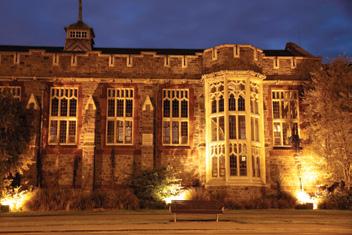
“We would like to see private schools in New Zealand with enhanced capacity to open their doors to more families. Our schools are very committed to contributing to equity in education.
“However, with an unfair and inequitable government funding model and subsequent constraints on financial resourcing, they are not able to offer learning opportunities to more children.”
Public schools are still a great place to go to school as there are many positive outcomes for many students who went to a
state school. “Every child can do exceptionally well at their local state school in this country,” Daniel says.
“There are great teachers right across the schooling network and it is these relationships that make the biggest difference to learning.”
Both state and independent schools are great places to send your children to, as they play an essential role in a child’s education.
Reflecting on how rewarding being the principal of Nayland College is, Daniel says, “Playing a part in nurturing an environment whereby so many students achieve at such a high level across a wide variety of activities – academic, sport, arts, cultural and community pursuits.
“Playing a key part in creating a positive learning community that values all learners.”
Although Daniel is a state school principal, he believes his skills as a principal are transferable to many different communities. “I would never exclude myself from any potential role where I could make a difference.”
As the Chief Executive of ISNZ, Guy Pascoe has had many jobs in the education industry, including as a teacher at a state school and overseas.
“In my early career I worked as a biology and outdoor education teacher at a state school in New Zealand, and then in Japan, England and Honduras,” Guy says. Whether or not a child attends a state, state-integrated or independent school, they will excel in their education and gain many different opportunities.
20 | Term 3, 2023 News | School Life
Christs College, Christchurch
Photo supplied by Nayland College.
“We would like to see private schools in New Zealand with enhanced capacity to open their doors to more families. Our schools are very committed to contributing to equity in education.“
Breaking down boundaries Benefiting Māori people in education
By Natasha Parrant
Mana ōrite (equality) for Te Ao Haka (a culturally reactive art form) is heading in the right direction of better serving Māori in education, according to the New Zealand Council for Educational Research (NZCER) Rangahau Mātauranaga o Aotearoa.
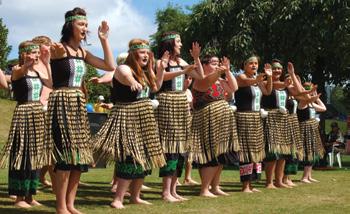
New research from NZCER shows providing Te Aho Haka mana ōrite (equal status) within NCEA and The New Zealand curriculum will be beneficial for ākonga (students), whanau (family), and Māori kaiako (teachers).
NZQA (New Zealand Qualifications Authority)

Mana Tohu Mātauranga o Aotearoa states that Te Ao Haka is a new performancebased subject. The subject gives opportunities for ākonga
to partake in Māori culture, language and historical methods.
‘Ngā whai painga o Te Ao Haka: The positive impacts of Te Ao Haka for ākonga, whānau, and kaiako’ is a kaupapa Māori research from Te Wāhanga. The research aims to understand what benefits and modifications can occur for Māori ākonga, whānau, and kaiako when a subject like Te Ao Haka has mana ōrite (equal status) within NCEA and The New Zealand Curriculum, as stated by NZCER.
The release displays the positive impacts of the new mātauranga Māori qualification, Te Ao Haka. The Te Ao Haka subject is evaluated by achievement grades that go towards NCEA.
The subject benefits ākonga in various ways because it: Strengthens identity, culture and Māori language; positively adds to skills, outlooks and qualities that help wellbeing, accomplishments and performance; offers learning and skills that are exchangeable to other subjects, and forms the habits of hard work, mastery and high expectations.
“Te Ao Haka provides important lessons for the development of future mātauranga Māori qualifications - and for schools that want to incorporate mātauranga Māori into their local curriculum,” NZCER’s senior researcher (kairangahau mātua), Nicola Bright says.
The subject is great for ākonga and a beneficial way of delivering quality education that greatly helps Māori people. There are many positive changes occurring in schools teaching Te Ao Haka. Nonetheless, there’s still room for improvement to highlight the equal status of Māori performing arts in English-medium schools - a problem that has been emphasised in the research.
Contributors in the research saw Te Ao Haka as the key to moving forward in equity and awareness of mātauranga Māori in education. The subject can form a greater understanding of te reo Māori (Māori language) and tikanga Māori (an idea including practices and morals from Māori mātauranga, Māori knowledge) in Aotearoa.
Term 3, 2023 | 21 News | Māori Education 11 Salisbur y Rd, Richmond Phone: (03) 544 1989 Email: reception@days.co.nz FOR ALL YOUR PLUMBING REQUIREMENTS Available after hours for emergencies Grey power discounts www.timmillerplumbing.co.nz • Plumbing & Drainlaying • Repairs & Maintenance • After hours emergency ser vice • Free Quotes • Grey power discounts Nelson 03 547 4532
Developing student financial wellbeing through game-changing EdTech
How
an NZ-based company is supporting secondary students for life after school
We live in an increasingly complex financial world, and many of us are ill-equipped to navigate this well.
Low financial literacy is a problem felt by individuals, communities, and society at large. Banqer was founded to tackle this very challenge and has become the leading financial education platform for primary and secondary schools in Australasia.
Banqer High creates a simulated virtual economy in the classroom. The platform enables (NZ) Years 9 to 10 / (AU) Years 7 to 10 students to practise making financial decisions in a safe environment. Now, the platform is evolving, with a senior student stage coming online in 2024.

This new Stage 3 will support schools to provide senior students with the crucial knowledge and abilities needed to navigate financial life immediately after school. Stage 3 will complement a school’s pastoral care program and amplify student wellbeing.
Banqer’s Co-CEO Simon Brown says, “We’ve already proven Banqer has an educational impact for junior secondary students. Now we want all senior students leaving school with the most relevant life skills across careers, pathways and personal financial management. We’re excited to support schools in delivering that.”
In the real world, school leavers must, in a short space of time, make decisions around leaving home, taking on debt, enrolling in study or choosing a career pathway. In many cases, these decisions will shape that young person’s future. Banqer Stage 3 will give young people practice evaluating real-life contexts across these areas and more.
Seen together, Banqer’s Multi-Year Level Platform will offer a learning progression that builds a solid financial literacy foundation:
Stage 1: focuses on knowledge acquisition and comprehension Stage 2: provides greater opportunities to apply and analyse financial topics.
Stage 3: develops critical thinking andproblemsolving skills to evaluate real-life contexts.
In Stage 3, students will be largely self-led and selfpaced. In the simulated virtual world, they will test their understanding and application of financial concepts. They can (and likely will!) make mistakes - but in a risk-free environment - and have the opportunity to learn from those mistakes and take corrective action.
Careers and Pathways will be a major feature of Stage 3, setting the scene for all Banqer High interactions.
Students will analyse various career and pathway options, focusing on preparing them for future careers (or dream jobs). Decisions made in this topic will ripple out across the platform, impacting areas like
income, living arrangements and budgets. This mimics real life, where employment or study decisions will define school leavers’ lives for the next half-decade.
Banqer’s Product Owner (and previous Deputy Principal at Mountainview High School), Marc Capstick, is most excited about the Careers and
Pathways topic. “How many of us left school without properly thinking through our work or study decisions? Without fully understanding how these decisions might shape our adult lives? Banqer’s Stage 3 will help soon-to-be school leavers develop the awareness and critical thinking skills to make thoughtful decisions for their lives. That’s powerful stuff.”
For schools, Banqer High Stage 3 represents one of the biggest advancements in reporting learning outcomes. Leadership will have detailed insights into student progression across the school, Year Levels and classrooms. This will enable leaders to directly attribute investment in the platform to improved students’ financial literacy, making reporting to the Board, the community and parents seamless.
As a previous school leader, Marc notes this improved reporting will be a game changer. “With my experience as a Deputy Principal, I’m close to this. This is a system I would have loved as a school leader. A system that shows key stakeholders the difference educators are making in the classroom.”
22 | Term 3, 2023
“We’ve already proven Banqer has an educational impact for junior secondary students. Now we want all senior students leaving school with the most relevant life skills across careers, pathways and personal financial management. We’re excited to support schools in delivering that.”
Banqer High Stage 3 is built around the most significant financial decisions school leavers will face in their immediate futures. As students explore the platform, it will present challenges requiring them to demonstrate a range of knowledge and abilities across:


Careers and pathways evaluate different study and employment options, make informed decisions on their career pathway, and create a Digital C.V.

Banking practice regularly checking accounts to effectively evaluate their financial position, which derives decision-making across all areas of the platform Credit and debit explore buy now and pay later schemes, credit cards and other forms of finance to highlight the pressures of short-term debt on living affordability
Budgeting be guided through an effective budgeting process and be required to identify budget variance and take corrective actions
Renting decide on different accommodation options, undertake a cost of living exploration, and make individual and group decisions within their financial constraints Transport evaluate transport options, exploring needs and budget impacts, including upfront and ongoing costs of vehicle ownership and sustainable transport.
Additionally, students will learn how to grow their wealth through investments in the Banqer High Stock Exchange, protect their assets and income with insurance, and understand why participating in KiwiSaver is important.
Banqer High Stage 3 helps students appreciate the impact of their decisions by seeing cause and effect play out in
a safe simulation before they get to the real world. When they complete Stage 3, they will have the knowledge and tools to effectively navigate the current and future economic challenges young people face.
Term 3, 2023 | 23
“Banqer’s Stage 3 will help soon-to-be school leavers develop the awareness and critical thinking skills to make thoughtful decisions for their lives. That’s powerful stuff.”
On the move
Including everyone in physical activity
By Natasha Parrant
According to Education Gazette editors, as posted in April 2023, for the first time this year Aotearoa will host the International Symposium of Adapted Physical Activity (ISAPA), which is a chance to exchange knowledge and experience in expert preparation, research, support, and service delivery in the modified physical activity, physical education, and sport science areas.

As stated by ISAPA, it will be the 24th ISAPA this year and will be held in Ōtepoti, Dunedin. The symposium was held on June 25 with an adapted physical activity sport and recreation day and finished with a gala dinner on June 29.
The Education Gazette stated the symposium host, Michael Woods, spoke about building an atmosphere where all ākonga can equally partake in and celebrate sport.
Michael started Inclusive Sport Design as a resource blog in 2017, but then it eventually expanded into a business that aims to invite, include and celebrate everyone in playing and competing in sports.
He started the blog to share details, helpful resources, and stories and/or experiences that he’d heard about during his own practitioner adventure. “I wanted to create the resource I wish I had access to when I started my career.”

The business now gives advice, consulting, and educational services to sports organisations, clubs, and volunteers. “The ultimate goal is to create solutions for sports that help inclusion happen at scale, so everybody can be involved, welcomed, and celebrated in sports.”
Michael aims to work towards building an atmosphere in the sporting field where everyone can equally get involved in sports despite having a disability.
“In my experience, most people involved in delivering sport don’t lack the willingness to create inclusive environments, but rather they lack the skills and knowledge to convert that willingness into meaningful action. So that’s where Inclusive Sport Design comes in.”
People with disabilities and other minority groups can experience many challenges that make it harder for them to get involved in sports.
Therefore, they can have a tough time dealing with accessibility,





equipment, and frame of mind and often undergo inequity and prejudiced beliefs, which stops them from completely engaging. Financial obstacles also become problematic.
Michael says these difficulties stem from sports’ atmospheres and cultures, rather than someone’s needs being taken into account. He advises teachers and coaches to start by understanding others. He requests them to ask their students what they need and how they would like to play.
Once teachers and coaches understand people’s needs, desires, and goals, they should be able to alter their sports activities to satisfy these needs.
“Change how you teach, change or adapt the equipment you use, modify the field of play, and even change the rules of the game.”
Systems like TREE or STEP can be used to help change sports programmes. Michael thinks the change begins with forming the capability and confidence to advocate inclusion.
24 | Term 3, 2023 News | Sport & Activity • PLUMBING • DRAINLAYING • GAS SUPPLIER & FITTING • ROOFING 11 Purkiss Street, PO Box 925, BLENHEIM 7240 t: 03 578 0060 e: info@morganplumbing.co.nz www.morganplumbing.co.nz CATERING Perfect for school events No kitchen required We bring everything and do all the clean up CATERING PACKAGES fROM 60-900 PEOPLE CALL: 0800 241424 www spitroastauckland co nz QUOTE "SCHOOL" TO GET A STAINLESS STEEL COFFEE MUG
AUCKLAND’S BEST MOVING SYSTEM
ORDER BOXES, BOX DELIVERY & COLLECTION




We deliver the Plastic Moving Boxes, Wardrobe Boxes, Packing Materials, Labels, Cable Ties and a DollyYou Pack, Move & Unpack
ECOMOVE CAN PACK, MOVE & UNPACK

We provide the largest range of reusable moving boxes, and eco friendly packing supplies at the best prices in Auckland.
Our products are specifically designed to be superior to a cardboard moving box alternatives saving you time and money.

Auckland Wide, 50km from the CBD Phone: 09 215 5755 | Mobile: 021 326 683 | www.ecomove.co.nz
The Lido Aquatic Centre
we put leisure in your life and life in your leisure
The Lido Aquatic Centre is more than just a swimming complex, it is a complete leisure and fitness facility catering for people of all ages and levels of fitness.

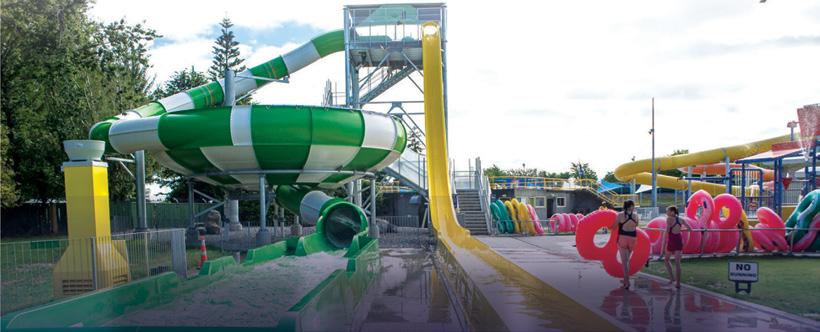
The Lido emphasises water safety and the SwimMagic swim school provides lessons for babies as young as five months, through to school age children right up to adults, who want to learn the basics or to continue developing their techniques. The lessons run seven days a week and learn to swim lessons are available during school holidays.
The Lido offers general fitness with a fully equipped gym where you can opt for a personal trainer to help with your fitness goals or join in on the group sessions that
run throughout the day. The indoor 25 metre and outdoor 50 metre pools are constantly in use for their Aqua Fit classes, which includes aqua aerobics and water Zumba.

Lido Aquatic Centre facility manager Lynden Noakes says, “These classes are great for people who prefer low impact exercises and really help to maintain fitness following injury”.
It also specialises in catering for school children with their Chill Out before and after school programmes along with their regular holiday programmes. The holiday programmes run each school holiday with various activities based at the Lido aquatic centre.



The holiday programme is divided into three age related groups; 5to 8-year-olds, 9- to 11-year-olds and 12+. Full days or half days are available and the programme is OSCAR and WINNZ accredited, so subsidies are available for parents who qualify.
The Lido has indoor and outdoor sports and leisure pools, a diving pool, gym, sauna, steam room, spa, and two hydroslides. Check the Lido Aquatic Centre’s website for more: www.clmnz.co.nz/lido/
Libraries for Children and Young Adults are essential for information and development.
Our children’s libraries equip children with lifelong learning and literacy skills, enabling them to participate and contribute to the community.
Our Services
Curriculum and class visits
Book swaps Tutorials
Our Branches
Kete
Researching skills
Childrens Services
Welcome
to Libraries Horowhenua
Horowhenua
Te Takeretanga o Kura-hau-po Te Awahou Nieuwe Stroom Shannon Library info@horowhenua.govt.nz 06 368 1953 tetakere.org.nz te.takere
Bring your
Classroom to Life


The new Insite Panel brings together whiteboarding, video conferencing, screen sharing and annotation into one device Increase engagement in your classroom lessons


Next Generation Interactive Panel
Direct Cloud storage
13MP Inbuilt Webcam
Full Android 11 OS with full access to google playstore.
4K Resolution with Gorilla Glass
Able to Wirelessly connect from Windows, Google and Apple devices Seamlessly cast your device and control it from the Panel
With the inbuilt Webcam, you can collaborate in person or via any video conference software. The Insite panel allows for direct access to cloud storage.
Full Annotation
With annotation tools at your finger tips, you can bring any document or media to life by annotating direct from the panel
Contact Phone:
Connect Collaborate
More
www.classtech.co.nz
a Demo Today!
Information: 0508 467 483
Book






Combining STEM hardware with full lesson plans & online training. A Full Turnkey STEM Solution. Join the group of Modern Educators. An innovative bridge between teaching and creativity in an immersive environment. SkriLab Engineering Kit Robotics Kit 3D Print Kit 0508 467 483 sales@conbrio-it.com ww.classtech.co.nz Education. Today.
Smart moves
Samsung’s Solve for Tomorrow competition is full STEAM ahead
The Samsung Solve for Tomorrow competition has returned for a third year in 2023.
With $20,000 in prizes on offer, the competition challenges Aotearoa’s next generation of innovators to change the world for good by solving an issue in their community using Science, Technology, Engineering, the Arts and Maths (STEAM), as well as design-thinking principles. Scientist, researcher, and TV sensation, Dr Joel Rindelaub, joins the competition’s VIP judging panel for 2023, alongside returning judges Dr Siouxsie Wiles, and MOTAT’s Education Lead, Julie Baker, and with support from Sarah Washbrooke, Deputy Chair of Technology Education New Zealand (TENZ). Dr Joel Rindelaub says, “I couldn’t be more excited to be coming on board as a Samsung Solve for Tomorrow judge this year. Anyone who knows me knows that I am very passionate about getting our young people involved in science and breaking the stereotype that a “scientist” is just an old dude in a lab coat. We
can all be scientists, and it’s great to be supporting a competition that encourages exactly that.”
Samsung Solve for Tomorrow 2022 saw some outstanding solutions entered. A group from Howick College won first place with their repurposed science fair project – a NonInvasive Diabetics Device, and students from Mount Richmond Special School came in a close second with their idea Kitchen Tools Reimagined.
Two entries were recognised with highly commended awards: Brooklyn’s Night-time Heroes, a tool to help children not lose their teddy during the night, and “Be Cool Bike to School’ a programme encouraging students to ride to school.
Julie Baker, education lead at MOTAT, believes the competition is going from strength to strength.
“In three short years we’ve seen this competition really grow and mature. It was great to see students practising the design thinking process last year, especially those who submitted a project plan.
“There was a huge improvement in solutions from the first time we saw their plans to the final entries they submitted. By developing problem solving skills now, students will be equipped with the tools they need for their upcoming careers.”
and it was one of the best entries we’ve seen!
“The solutions these kids come up with are incredibly impressive and it’s fantastic to see students applying their skills in STEAM subjects to solve real problems facing their communities.”
Entries are now open for Samsung Solve for Tomorrow 2023. Students in years 5-10 are eligible to enter as individuals or groups of any size.
Entrants have the opportunity to learn from the VIP judges to make their entries the best they can be, with personalised feedback available to students who submit project plans by 26 June. Students will then have until 4 September 2023 to submit their final entry.
Simon Smith, head of Brand Marketing at Samsung Electronics New Zealand says, “Kiwis are known for their ingenuity and innovation, and our next generation are no different.

“Last year’s winners had the idea to repurpose their science fair project for Solve for Tomorrow
Or, if students already have a solution ready to go from a previous school project or competition, they can enter it now.
The winning individual or team for Solve for Tomorrow 2023 will be announced in late September. To find out more, visit: www.samsung.com/nz/ solvefortomorrow.
30 | Term 3, 2023 Learning Space | Smart Education
“Last year’s winners had the idea to repurpose their science fair project for Solve for Tomorrow and it was one of the best entries we’ve seen!”
NURTURING HEALTHY MINDS
Online, 90 minute workshops


Facilitated by Cat Levine

School leaders and teachers play an important role in supporting the health and wellbeing of our tamariki and rangatahi. Life Education Trust offers targeted professional development to equip educators with knowledge and skills to support students.
Anxiety

Learn the signs and symptoms of anxiety, how it may present in students (including those with autism), calming strategies, types of treatment and where to go for help.
With Goldie Hamilton, Anxiety New Zealand Jo Charman and Tanya Blakey, Autism New Zealand

Digital Wellbeing

Develop strategies and processes for the safe and positive use of digital technology at school and beyond, including what to do when things go wrong.
With Anjie Webster, Generation Online







Neysa Koizumi and Megan Rutter, Digital Waitaha
Neurodiversity

Learn more about how the brain develops and influences behaviour so you can better support all students.
With Kathryn Berkett, Engage Training
Team rate: $80pp
For more information visit: www.lifeeducation.org.nz/teacher_PD
JUNE
ONLINE 3.30 - 5.00pm
- NOVEMBER DATES AVAILABLE $85pp
(Groups of 10 or more)


CHANGE YOUR
LIFE! PROUD To be a finalist ONCE AGAIN in the last NetGuide Best Employment site category! MYJOBSPACE.CO.NZ | 0800 486 329 | 38 LOWE ST, ADDINGTON, CHRISTCHURCH 8011, NEW ZEALAND Thousands of jobs ready & waiting for you right now! Connecting job hunters and employers since 2006
JOB CHANGE YOUR
form of advertising you can measure, then increase or decrease, so you can manage your workflow accordingly!
You’ve probably heard people talk about digital marketing, Google AdWords, online traffic, SEO and social media. Then on top of all that, you need to have a lead generating web presence with good traffic etc.
This can sound complicated – but it doesn’t have to if you talk to the right people.
Let’s start with the basics
Right now there are people looking for a business just like yours. However, if you don’t have AdWords, there’s a very good chance they’ve just clicked one of your competitors’ websites.
Most businesses would benefit from Google AdWords. It’s simple to set up, it’s fast, you set the monthly budget, and you can see the results immediately.
Included is a complimentary call tracking service to measure daily results, plus you get a monthly report that’s explained in as much detail as you like.
We have many success stories where people have thought marketing is a waste of money, but have finally found something that gives them a transparent Return on Investment.
If you would like to be our next success story, please call or email: enquiries@fatweb.co.nz
We have offices throughout New Zealand and can discuss your needs over the phone or by Skype.


Don’t let another year go by without truly discovering what digital marketing can do for your business.
With years’ of experience and having delivered outstanding results, we have some of the best digital experts in the business.
We are so confident, that if you aren’t 100% happy after the first month, you won’t pay a cent for the management fee. And if you mention this ad, set-up is free – a service other companies charge up to $3,000 for.
FREE call tracking, which means you can actually hear recordings of the phone calls coming into your business to see if your staff are doing things correctly or if they need more training. This tool can make a massive difference to the FAT on your bottom line.
Available to the first 25 people who book a consultation.
With over 15 years’ experience - we know what we’re doing.
- 38 Lowe St, Addington, Christchurch 8011, New Zealand
- Level 6, 3-13 Shortland Street, Auckland CBD, Auckland 1010
Call 0800 FATWEB, or email enquiries@fatweb.co.nz to book a FREE consultation.
0800 FATWEB | www.fatweb.co.nz
Aiding education
Learning via innovative technology
The Education Technology Association of New Zealand (EdTechNZ), is the voice of edtech in New Zealand, supporting the growth of the sector.

Their mission is to improve the lives of people and increase the access to, quality, and impact of education through innovative technology for the benefit of education and learners across Aotearoa New Zealand, and around the world.
Their members range from edtech companies, universities, government agencies and large tech companies who all share a passion for the potential that education technology can bring for New Zealand’s prosperity.
Together, they want to provide an independent voice for the edtech ecosystem.
EdTechNZ connects, promotes and advances opportunities and education through technology.


They connect the local edtech community together through networking events, working groups and meet-ups across the country to create a connected ecosystem.
They promote the mahi and work their members do within Aotearoa and abroad to assist their companies to be leaders on the international scale.
And, they advance the edtech sector through their research reports and advisory work with government agencies, such as the Ministry of Education and Education New
Zealand, to help create equity for all learners.
Currently, EdTechNZ is working on a wide array of topics and issues.
They’re delegating tours across the world to edtech conferences and conducting research on the sector with the last report in 2021 and one coming up in 2023.
EdTechNZ is also working on an EdTech directory which is a directory of all the edtech companies within New Zealand to assist teachers, schools and the wider community to find new educational products and services.

The organisation also hosts events and webinars which keep the community up to date with the latest insights in the tech sector and how it can impact education.
Recently, they’ve assisted the Ministry of Education with the Digital Strategy Refresh to keep them informed of the tech advancements within the sector as well as local edtechs that are of value.
Not only this, but they’ve worked on the Safer Technologies 4 Schools assessment framework which is a reporting process through the Ministry of Education to ensure that all products and services used within schools keep student data secure. Alongside this is the EdTech Privacy Pledge with the ministry – a tiered system to assist edtechs that are working towards the Safer Technology 4 Schools assessment to show they meet a high standard of student data privacy.
EdTechNZ have a strong focus on edtech for export to help grow the local economy and to support their edtechs to grow in the international market.
EdTechNZ
09 475 0204
info@edtechnz.org.nz
www.edtechnz.org.nz
34 | Term 3, 2023
Technology | EdTech NZ
EdTechNZ connects, promotes and advances opportunities and education through technology.
Let us at Kaipara IT Support you and your school
As a school principal, you are the pivot around which your institution rotates. Your responsibilities span numerous domains, extending beyond administrative and educational leadership. In the digital age we live in, managing technology within your school is a significant task, and it’s critical for you to have exceptional computer and IT support.
Your school’s Information Technology (IT) isn’t just about fixing computer glitches or software hiccups. IT has a larger role in shaping the educational landscape, enhancing teaching methods, and streamlining learning processes. Whether it’s enabling remote learning, safeguarding online exams, managing digital attendance, or protecting sensitive data, IT forms the foundation of modern schooling. Having solid IT support helps you ensure all these processes run without a hitch.
Without strong IT support, you might find yourself juggling technical issues that distract from your primary responsibilities. Technical hiccups can disrupt learning, impact your teachers’ performance, and even risk student data privacy. However, outstanding IT support can effectively handle these problems, providing timely fixes and allowing you to harness the full power of technology.
By ensuring top-notch IT support, you can create an optimal environment conducive to 21st-century education. This will

not only make your operations more efficient but will also pave the way for innovative learning methods, fortifying the future of your institution. The more you embrace the digital era, the clearer the importance
of having great IT support becomes. This support is key to empowering you and, ultimately, the educational institution you lead.

Contact us on 0800 263 896 (0800 2 NETWORK)
EMPOWERING PRINCIPALS
Are you a school principal struggling to navigate through the challenging waters of modern technology in education?
Look no further than Kaipara IT! We are your ultimate partner in bringing the future of computing into your school. Our team of dedicated IT professionals specialise in providing tailored computing solutions for your school, ranging from hardware setup, software integration, data management, cybersecurity, and much more.

By understanding the unique needs of each educational institution, we ensure your school is equipped with the latest tech tools that boost productivity, enhance learning experiences, and foster innovation. With Kaipara IT, you can confidently lead your school into the digital age.
0800 263 896 | support@kaiparait.co.nz
www.kaiparait.co.nz
Inspiring kids to read for pleasure is just as important as ensuring they can read, and some of New Zealand’s leading literary advocates are calling for a greater focus on reading for enjoyment as education takes the spotlight.

Alan Dingley is a school librarian and New Zealand’s next Te Awhi Rito Reading Ambassador, and Tania Roxborogh is an award-winning author and secondary school teacher. Both say reading for pleasure is an overlooked element in

the discussion about learning outcomes, and more needs to be done to encourage it.
Reading for fun is at the heart of HELL’s Reading Challenge, which is now in its tenth year. The challenge, which is administered by the New Zealand Book Awards for Children and Young Adults is free for schools and libraries to join.
Alan, a former New Zealand Book Awards for Children and Young Adults judging convenor, says it can take just one book to hook a child into reading, which increases vocabulary, imaginative thinking and well-being.
“Reading for pleasure is something we so desperately need to normalise here in NZ, and as a librarian, it’s about knowing your collection and pairing your reader with a book
that suits them. It’s important there are initiatives that remove the stigma of reading not being ‘cool’ and are open and accessible to everyone,” Alan says.
Tania participated in last year’s Great NZ Book Trip, talking to school children about her 2021 Margaret Mahy Book of the Year
winner, Charlie Tangaroa and the Creature from the Sea. She says children are choosing to read less with the distractions of modern life, and that forcing them to read can backfire.
“There are children who can’t read, and then there are those who can but don’t want toand both situations are very different. Reading for fun doesn’t carry the same value as it did for previous generations - we need to motivate them to pick up a book.
“When kids read because they want to, they build critical thinking skills creating wellrounded humans. It’s not just about reading the text on a page; it’s making sense of it and understanding the words. It can be the smallest thing that inspires them to pick up a book.
“Having the Reading Challenge readily available in schools is important because it could be one element - like the live readings - that inspires a student and begins a lifelong love of reading,” she says.
36 | Term 3, 2023 Being Proactive | Literacy
Tania Roxborogh.
“There are children who can’t read, and then there are those who can but don’t want to - and both situations are very different. Reading for fun doesn’t carry the same value as it did for previous generations - we need to motivate them to pick up a book.”
Making reading fun is the key to improving literacy
Electronic




Highways and Byways - Highway1 has it all! Check out our product range at www.Highway1.co.nz. Highway 1 is a significant manufacturer and supplier of temporary traffic management equipment from safety signs, electronic variable message signs (trailer or truck mounted) traffic lights and many Bitumen Products. Traffic management, H & S, construction, Signage, carpark range products we have you covered. We have office’s in both Auckland and Christchurch, where you can visit and pick up or we freight throughout New Zealand, and we cover insurance for free on deliveries. We are here to help, have quality products and won’t be beaten by price. Give us a call 0800 175 571 or visit our website www.Highway1.co.nz Road safety products Cones, cone arms, flexiposts and bollards, reflectors safety fences, vests, sandbags. Signs We manufacture all temporary warning signs & personal protective signs (PPE) for all Sizes for hazards & safety requirements. Enquire & we will make it for you
& Concrete Maintenance Bitumend range
Coldmix,
seal, joint filler, Rejuvenate, E-release and applicator equipment.
Asphalt
-
Crackfix, Top
signs
lights,
park & workplace safety Speed humps, wheel stops, channel cable protectors, Safety mirrors. Construction products Bunting, marking tapes, line marking.
AWVMS, Arrow boards traffic
Variable message Signs (VMS) and Truck Mounted Attenuators (TMA) Car
Taking action to combat climate change
Climate change is a global issue, particularly affecting the younger generation. So, what are Aotearoa schools doing to save the planet, and do tamariki understand the impacts of climate change?
New Zealand Council for Educational Research senior researcher Rachel Bolstad wrote a national overview in 2020 on ‘How can New Zealand schools respond to climate change?’
The country is required to present National Communication reports to the United Nations Framework Convention on Climate Change every four years (UNFCCC).
The last report, as reported by the Ministry for the Environment in 2017, suggests there are opportunities for schools to teach their pupils about climate

change and sustainability issues through many year levels of the curriculum.
The government also provides resources and funded programmes to encourage schools to educate the youth on climate change. It’s up to individual schools whether they want to take part in focusing

their energy on educating pupils on climate change and living sustainably, Rachel stated.
School principals and boards of trustees are often in charge of anything to do with school property and how the school will run, Rachel wrote.


One of her interviewees said, “We tend to do a really good job


in education of saying, we want to do this, and then it is just left to people to get there on their own. Not all schools are created equal. And in this instance, that’s not going to be acceptable (Secondary educator, cited in Bolstad, 2020b).”
According to The New Zealand Curriculum Online, one of the curriculum’s resources is on Education for Sustainability (EfS), which is about highlighting the importance of learning about community values, knowledge, and skills to make a positive change in the world.
A whole-school approach is important because it allows ākonga, teachers, team leaders, and the community to take in the various EfS terms and values and implement this into the school culture. There are EfS programmes resources like Enviroschools, research projects, climate change guides for schools, Para Kore, and more.
FOR FAMILIES


Learning Space | Natural Disasters We keep you calm, warm & hydrated when things go wrong. What’s your family’s plan for when things go wrong? If evacuating is the best move, our Grab Bags will keep your survival basics covered for 24 hours. If you’d like extended coverage, our Survivals Kits will give you peace of mind. These kits can provide up to 6 people with 72 hours of supplies. 3 Water & Food 3 Warning Lighting & Shelter 3 Health & First Aid 3 Hygiene & Sanitation 3 Tools & Management SURVIVAL KITS
sales@thesurvivalco.nz | www.thesurvivalco.nz OR
Experience Eden Park like never before
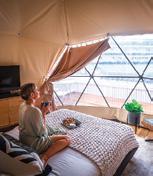


Looking for an exciting venue for your next school trip? Eden Park, a truly iconic stadium and sporting gem, offers a unique experience that combines history, sports, and entertainment, making it an ideal destination for students.
With a remarkable 120-year history, Eden Park has witnessed countless legendary moments in the world of sports and entertainment. Our Stadium and Rooftop Tours provide a unique chance for students to explore this renowned venue, delving into its storied past and immersing themselves in its vibrant present.
During our Stadium tours, students will get to go behind the scenes and feel the thrill of walking through the players’ tunnel and out onto the hallowed turf, experience the excitement of the changing rooms, and even get to sit in to hot-seat in the coaching box. Our expert tour guides
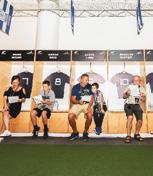
will captivate students with fascinating stories and behind-the-scenes anecdotes, shedding light on the remarkable legacy of Eden Park. For a different perspective of the park and views of Tāmaki Makaurau Auckland, our Sky Sport Rooftop tour is an experience that shouldn’t be overlooked for secondary school students.
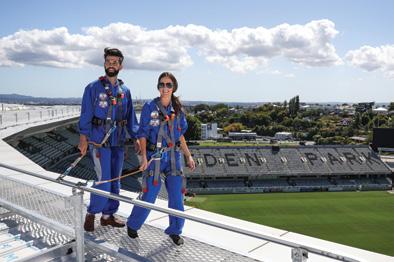


As students explore Eden Park, they will walk in the footsteps of their sporting idols. They will witness the meticulous care given to the No. 1 turf, soak in the electrifying atmosphere of the stands, and envision the roaring crowds that fill the venue during thrilling matches.
To ensure that every student can fully participate, our team can provide wheelchair accessibility and personalised assistance to ensure everyone has a great experience.
Eden Park offers an educational and engaging experience that combines
history, sports, and entertainment, leaving a lasting impression on your students. Tell us what you are after, and our team can help create unforgettable memories at our exceptional venue!
Get in touch with us at info@edenpark.co.nz

AUCKLAND’S
EXPERIENCE Search Experience Eden Park
PLAYGROUND
SKY SPORT ROOFTOP TOURS
STAYDIUM GLAMPING
STADIUM TOURS


COLLISION REPAIRS Our Collision Repair Shop Services are Panel beating, Spray Painting, Rust Repairs, Plastic Welding & Approved Structural Repairer with most Insurance Companies 03 388 5187 qe2collisionrepairs@outlook.com 302 Travis Road, North New Brighton, Christchurch
COLLISION REPAIRS

At QEII Collision Repairs we strive to make the stressful time after an incident go as smoothly and effortlessy as possible for our customers, to get you back on the road quickly and safely.


We have a friendly team of experienced and knowledgeable staff ready to help assist you from the beginning to the end of your repairs. If you come into our shop, we can help you make your claim online or over the phone, help answer any questions you have regarding your claim, repairs or excess and can even pick up/deliver you or your car for no extra cost.
QEII Collision Repairs took over a pre-established panel-beaters in 2016 and business has grown significently over the years. In 2019, a second spray-painting booth was installed and an additional work-shop was added to meet the high turnover of business we have to get our customers back on the road more effeciently.
Our hard-work, commitment and loyalty to our customers and their insurers has not gone unseen as we graciously were one of only 6 shops in Christchurch to receive a contract with IAG this year, the largest insurer in New Zealand. It is reassuring to be recognised by both customer and insurer and the impact we make in our industry within our community and we hope to continue to grow from strength to strength in the future.
We would also like to take a moment to voice our support to the charities that we support every year
The Rotary Club of Christchurch Sunrise
The Kids Foundation
Lions Club of Christchurch South
The Cancer Society
OUR SERVICES INCLUDE:
• FREE No Obligation Quote - and we can even come to you!
• FREE Pick up/drop off service
• Gold Card Holders receive 10% off your excess
• We can help you make your claim to take the stress off
For 100 years the CRA has set the benchmark for high-quality, safe vehicle repair.
Advancements in automotive technology – in particular safety systems – require expert knowledge to repair.

The CRA demands its members continually develop their knowledge to meet that level to help ensure your car is as safe after an accident as it was before.

Your insurance company may direct you to a repairer after a crash; however, it’s YOUR RIGHT to choose. Choose CRA for safety and quality assurance.
for your
OPENING HOURS: Monday - Friday 7:30am - 4:30pm
See www.collisionrepair.co.nz
nearest CRA repairer
*Terms & conditions apply 302 Travis Road, North New Brighton, Christchurch | P: 03 388 5187 | E: qe2collisionrepairs@outlook.com
CO2 IN CLASSROOMS
Studies have suggested that the perfect CO2 conditions for an average classroom would be 1200 parts per million (ppm) of CO2 in a room. This level is not consistently achievable through natural ventilation and as such we recommend the use of a heat recovery ventilator
The Heat Recovery Ventilator unit has four main functions:

1. An exhaust system
To flush humid stale air caused by your normal indoor activities to outside. The main causes of high indoor humidity & CO2 within the classroom are:
• Low natural ventilation (security and cold weather force us to keep windows closed)
• Breathing of 30 + students and teachers
2. A continuous fresh air supply
Air sourced directly from outside is naturally rich in oxygen and low in impurities. The nature of constant trickle ventilation is that particles in the air that are non-desirable such as viruses, mould spores and dust mite faeces are diluted to the point

on near elimination. New Zealand standard NZS4303 recommends 8l/s per person, given the increased risk of COVID we doubled this to 16l/s per person to ensure there is more than sufficient air movement within the classroom.
3. Heat recovered energy
is conserved
Heat recovered energy is conserved within the ventilation system by the advanced aluminium heat exchanger, tempering the incoming fresh air to a few degrees of the current indoor temperature whether it is winter heating or summer cooling. This allows proper ventilation to occur whilst conserving energy and heat loss within the classroom.
5. Reduces Indoor humidity & CO2 Levels
Indoor air is nearly always of a higher absolute humidity & CO2 concentration than outdoor air, daily
The Heat Recovery Ventilator unit has four main functions

• An exhaust system
• A continuous fresh air supply
• Heat recovered energy is conserved
• Reduces Indoor humidity & CO2 Levels
Fresh Air from Outside Stale Air to Outside Warm, Stale Air from Inside Pre-heated Fresh Air to Inside
activity continues to increase the CO2 levels & water load within the classroom. By exchanging this air with outdoor air, total humidity & CO2 levels indoors are reduced; the extra heat given to the outdoor air reduces its relative humidity to an even lower level, thus creating a healthier learning environment.
Research by Harvard University in 2016 found statistically significant declines in cognitive function scores when CO2 concentrations were increased to 950ppm - which is common in indoor spaces, and an even larger decline when CO2 concentrations reached 1400ppm. The maximum concentration should not exceed 2000ppm for more than 20 consecutive minutes per day.
600 – 1000 ppm complaints of stuffiness and odours
1000 – 2500 ppm general drowsiness
Schools around the world and here in New Zealand have recently been installing CO2 monitors to enable the teacher to see when CO2 levels are reaching excessive levels and open window’s accordingly to ventilate the classroom. In this situation any heat used to warm the learning space will be lost through the windows, an expensive option. By using a heat recovery ventilator, the classroom air is kept
constantly fresh, and the exhausted air is utilized to heat the incoming air.
Maintenance
Maintenance and ongoing upkeep need to be considered. We are building all our externally mounted units out of 304 stainless steel - internally mounted units will be galvanised sheet steel. The heat exchangers are easily removed to allow cleaning or replacement should it be required. There is easy access to the filters to allow regular replacement.
Future Development
There is still a requirement to provide separate heating and cooling options. As we develop our heat recovery ventilator further, we hope to include this within our system.
The installation of ultraviolet light to further enhance the ability to remove contaminants, is something we are currently looking into including within our unit as well.
Installation
Installation will vary between classrooms as there are so many variables that need to be
considered. The requirement to meet NZ35 noise levels in classrooms needs to be carefully evaluated, and will almost certainly be different for each classroom. There is no one size fits all option.
Proven Performance
The heat exchanger we are utilizing has been in use throughout New Zealand for over 25 years, during this time there have been no failures.

Running Cost
The running costs on the system are minimal as the systems power requirement consists of just two fan units each drawing just 60 watts providing 24hrs continuous effort for only $17.28 per month (based on 20c per kW/hr)
Contact us today for a free no obligation quote to provide your classroom with a healthier leaning environment.
Email: chch@hussmann.com | Address: 7 Dalziel Place Woolston, Christchurch 8023 Phone: 03 348 7018 | www.mcalpinehussmann.co.nz
UCOL Trades Academy Partnership Benefits Queen Elizabeth C ollege Students

Queen Elizabeth College Principal Chris Moller has seen how Trades Academy programmes benefit students from as early as Year 11.
Queen Elizabeth College (QEC), a co-educational school in Palmerston North, gives its students the opportunity to study U-Skills Trades Academy programmes at UCOL |Te Pūkenga. U-Skills programmes allow Year 11 to 13 students to attend classes at UCOL one or two days per week to develop industry-relevant skills.
In 2022, QEC and UCOL partnered to deliver a Level 1 Intro to Trades programme for Year 11 QEC students. The programme gives students a taste of construction, automotive engineering, and mechanical engineering. It includes 29 NCEA credits.
This year, Intro to Trades expanded to include students from Palmerston North Boys’ High School and Te Kura Correspondence School.
The aim of the programme is for students to find a trade they enjoy and then progress onto the relevant Level 2 and 3 U-Skills programmes.
UCOL Te Pūkenga had been running Intro to Trades at Otaki College for a few years prior, and it caught Chris’ attention.
“We wanted to develop new practical programmes for Year 11 students. We looked at a range of things, but the UCOL programme at Otaki interested me because I could see an increasing number of pupils that were not heading to university and wanted to get the skills to do apprenticeships. That vocational pathway was something we were looking to develop,” says Chris.
“Some of these students aren’t hugely engaged in school, but getting the chance to spend one day a week at UCOL excited them and opened their eyes up to a tertiary institution. It showed them that high school has a pathway to lead them into further study, training, or work.”
Since 2015, 75 QEC students have enrolled in U-Skills programmes. Chris says having U-Skills courses available from Years 11 to 13 has been beneficial because it creates a natural flow for the pupils, many of whom go on to study UCOL after they finish Year 13.
“The good thing about starting them in Year 11 is that a lot of these kids have really good skills anyway. The age isn’t that important – it’s about the readiness of the pupil.”
U-Skills Trades Academy 1 Day U-Skills Trades Academy 2 Day
The Academy 2 Day option gives you the chance to work towards or gain an industry related tertiary qualification while also working towards NCEA Level 2/3 at school.
How To Apply
Send your completed application form to: U-Skills Enrolment: UCOL Private Bag 11022 Palmerston North 4442
or
Email to: uskillsenrol@ucol.ac.nz
Please complete the following steps:
• Complete the U-Skills Application form ensuring you and your parent/guardian sign the last page.
• You must also include a verified copy of your birth certificate.
• Ask your school to endorse your application.
For more information, contact: u-skills@ucol.ac.nz or visit ucol.ac.nz/u-skills This advertisement is intended as a guide only. Programme details are subject to change. Please refer to ucol.ac.nz for the most up-to-date information.
Programme Level Approx NCEA Credits Manawatū Whanganui Wairarapa Horowhenua Otaki College Tararua Construction 2 24-28 Construction 3 22 Applied Construction Design 3 27 Intro to Plumbing, Gasfitting and Drainlaying 2 22 Gamification (Design & Development) 3 22 Automotive 2 28 Collison Repair 2 25 ICT Innovation 2 23 ICT Innovation 3 22 Mechanical Engineering 2 22 Hair, Beauty & Retail 2 24 Barbering 2 28 Café Skills 2 21 Cookery 3 24 Business Administration and Technology 2 24 Business Enterprise 3 24 New Zealand Police Pathway 3 22 Defence Pathways 2 24 Applied Technical Laboratory Science 3 22 Intro to Early Childhood 2 22 Exercise & Sport 2 22 Health 3 20-24 Forestry 2 24 Te Kura Tapere (Certificate in Introductory Conservation) 3 30 Programme Level Approx NCEA Credits Manawatū Whanganui Wairarapa Horowhenua Otaki College Tararua New Zealand Certificate in Building Construction & Allied Trades Skills 2 40 New Zealand Certificate in Infrastructure Works 2 40 New Zealand Certificate in Animal Care (Companion Animals) 3 27 (70 UCOL credits) New Zealand Certificate in Cookery 3 60 Salon Skills (Introductory) 2 61 New Zealand Certificate in Makeup and Skincare 3 63 New Zealand Certificate in Commercial Road Transport Skills 3 55 New Zealand Certificate in Early Childhood Education and Care 3 60
Outdoor Education New Zealand
 By Timmi Aplin-Barrett
By Timmi Aplin-Barrett
Outdoor Education New Zealand (OENZ) is the home of quality outdoor training in New Zealand. They offer courses for schools, groups, clubs, and workplaces, as well as offering instructor training and recreational training.






OENZ can offer a qualified, experienced instructor to run or assist school programs, camps and activities. They can plan school camps for Years 1 through to 13. From logistics and equipment to safety management and staffing, they can manage it.
They also have the flexibility to work in any area. Camps are customized to deliver the intended outcomes a school chooses.
OENZ understands it is important to include strong curriculum links when planning education outside the classroom.
Activities can include abseiling, rock climbing, overnight tramping, orienteering, bushcraft, kayaking, high low ropes, mountain biking and more.
They’re also able to help guide students within their Duke of Edinburgh journey safely
for bronze, silver or gold expeditions.
OENZ offers a massive range of training courses. From alpine, avalanche, bushcraft and navigation to rock climbing, river safety, sea kayaking and hunting as well as weather courses, trail training and adventure race training, OENZ can do it all.
For teachers wanting to become a qualified outdoor instructor or guide, there are several courses that OENZ offers.
This would be a fantastic way to ensure your school continues
to forge ahead with outdoor based learning and would open up many more opportunities for students looking to pursue outdoor based careers.
The 15-week instructor training program is specifically designed for people who want to lead others in the outdoors.
This course involved alpine and avalanche awareness, bushcraft and river crossing, rock climbing, sea kayaking, adventure-based learning and field and weather observations. These courses begin in September and run through to December.
46 | Term 3, 2023 Learning Space | Outdoor Education Play. Stay. Explore. Adventuremark Safety Audited | Experienced Guides Biking, Kayaking, Adventure Races, Paddle Boarding and more Contact us to create day or multi day adventures for your group, Phone 0800 287 448 | www.riversideadventures.co.nz
The 12-week instructor training programme is similar to the 15week course but focuses only on bushcraft and river crossing, rock climbing, sea kayaking, adventure-based learning and field and weather observations. These courses begin in January and run through to March.
There are also instructor courses focussing on alpine training, bush training, rock climbing and sea kayaking. There are two types of alpine training; a seven-day course and a nine-day course. Bush instructor training also runs two courses; again, a seven and a nine-day course.













The same is true for both rock climbing and sea kayaking. The nine-day courses are senior based course for those who already have confidence and skills within these areas. For more information, visit the OENZ website at: www.oenz.co.nz. You can also call (03) 329 9076, or email: admin@oenz.co.nz

Where will your school be in 2024 or 2025? Whilst early planning is critical to achieve success, so too is booking with the right Student Tour Specialist. Defining Moments are specialists in creating and organising the very best Social Sciences, Media Studies, Languages, Cultural and Classic Student Group Tours. Defining Moments are TAANZ bonded and also a Founding Member of the Student Travel Collective, providing the utmost confidence that your students and funds are safe. Contact us with urgency today dmt@hot.co.nz | 0800 304 382 Founding member of the School Travel Collective Learning Space | Outdoor Education
New Zealand Outdoor Instructors Association Inc

A fantastic idea is to take school students to New Zealand Outdoor Instructors Association Inc (NZOIA) – it’s a professional outdoor instruction association, training people to become qualified outdoor experts to instruct others on how to do various outdoor activities since 1987.
Not only is this association all about education, having fun and being one within the environment, but it also allows people (including students) to participate.
There are memberships involved, courses available and the opportunity for school students to be a ‘model client’. This way students can train and explore for free.
The way this works is while a candidate (someone training to be an instructor), is doing an
assessment to become qualified, they will need ‘model clients’ to teach while they’re being assessed by the professionals. This opportunity allows students to do all sorts of outdoor activities, and therefore, learn new skills and/or develop their skills while meeting other people who are also doing the same thing.
It’s a great way to have fun and cut down costs on what would have been expensive outdoor activities.
Christian Youth Camps
CYC has been around for 67 years but
Gone are the early days of sleeping in the barn and the food cooked in the old cowshed; nowadays it’s cabins, hot showers, great food, and airconditioned dining rooms. But some things will never change, the hiking trails behind CYC are just as tough, the activities you can do at camp are still just as challenging, and spending the evening around a campfire or debriefing in the hot pool is just as relaxing.
Over the years CYC has grown to accommodate modern camping with its activities, meeting the highest safety standards with international accreditation and trained instructors who take

the hassle out of the health and safety part of taking kids to school camps.
Spending the evening around a campfire or debriefing in the hot pool is just as relaxing.
With two main accommodation areas, a total of 450 beds and catered and self-catered options, CYC has the flexibility to meet your specific needs.
All you need to do now is to contact the CYC office on 07 8248495 and book a time to visit and tour the site so you can see for yourself why your next school camp should be at CYC!
48 | Term 3, 2023 Learning Space | Outdoor Education
There are memberships involved, courses available and the opportunity for school students to be a ‘model client’. This way students can train and explore for free.
Photo by Jim Masson
that doesn’t make us old, it just makes us more experienced!
Experience and age group requirements:

NZOIA leader assessments
Entry level (little or no experience in the activity), so intermediate school students and above.
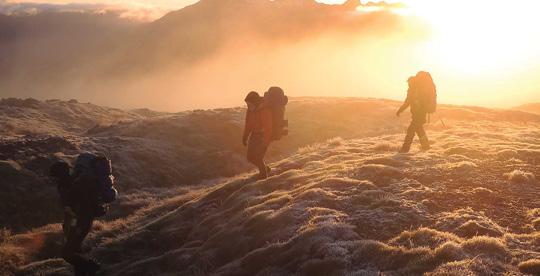

NZOIA 1 Assessments
Beginner level (little or no experience in the activity), but high school students and above.
NZOIA 2 Assessments
Intermediate level or instructor/ guide (lots of personal skills and experience for a minimum of 20 days and keen to advance their skills). This includes senior high school students and adults.


Learning Space | Outdoor Education
Opportunities for model clients involve activities like: • Alpine • Bush (tramping) • Canoe • Canyon • Cave • Rock • Mountain bike • Multisport kayak • Whitewater kayak • Sea kayak.
Photo by Keith Riley
For more information, visit: www.nzoia.org.nz. Book your camp winter for July, August or September 2023 and receive a 20% discount *some conditions apply 07 332 3510 tuiridgepark.co.nz bookings@tuiridgepark.co.nz
Photo by Asher March
One year before camp
3 Six months before camp
1. Select the camp location. Useful resources include the Directory of Residential Camps and the CCNZ web page: www.cci.org.nz
2. Take a tour of the camp facility before booking. Camps always have staff available to meet with camp coordinators and go over their plans. Any difficulties can be discussed and other options can be presented at this point. Careful planning at this stage eliminates confusion and worries later.

3. Sign a booking contract. Be aware of financial penalties and minimum charges should you have to cancel.
4. Place the camp dates on the school calendar.
1. Carefully think through the ultimate goal or purpose of your camp.
2. Consider all the costs and work out a camp budget. Remember camp fees, camp activity charges, bus cost, costs of visiting out-of-camp venues, special costs like hireage of equipment, prizes etc.

3. Consider fund raising activities if necessary.
Mercury Bay Holiday Park


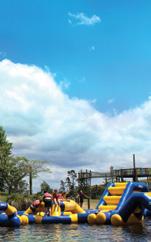
Three months before camp
1. Send letters out requesting fees and permission slips. Mention it in the school newsletter.
2. Consider arrangements for parent help and include in permission notice. Arrange this if it is needed.
3.Start to plan out the camp programme activities (possibly with students on a ‘camp committee’) and create a detailed camp schedule.
4. Touch base with the camp to make sure all plans are confirmed. Discuss activities with camp staff. (Some camps need to arrange extra instructors or have more than one group in at a time, so the earlier you are on to this, the better).
5. Request risk management sheets from camp or outdoor provider.

6. If you haven’t visited the camp, do it now.
One month before camp
1. Get aggressive on gathering permission slips and payment for camp. Ask about special needs, diets etc.
2. Finalise the programme, including some contingencies for bad weather. Forward the programme to camp staff.
3. Create a detailed ‘requirements’ checklists.
4. Develop your camp workbook for students.


One week before camp
1. Finalise details with camp staff, e.g. final numbers, special diets.
2. Gather up materials, prizes, games, musical instruments, sound gear, food etc.
3 3 3 3 3
On Camp
1. Enjoy the experience with your children.
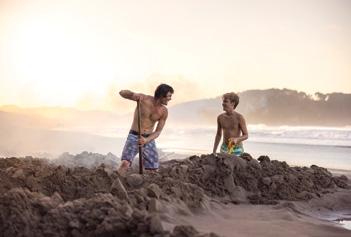
2. Delegate whatever you can to reliable parent helpers and responsible students.
3. Arrange a night roster for adults settling children after lights out. The teacher does not need to be up late every night! (The first night is usually the latest.)
50 | Term 3, 2023 An innovative and exciting camp experience Ph 03 541 8465 www.bridgevalley.co.nz BOOK YOUR SCHOOL CAMP NOW Private Kitchen Discounted Rates Amazing Activities 0800 246 823 hotwaterbeachtop10.co.nz MILES HOLDEN
If you are looking for a quiet, relaxed atmosphere with a full range of accommodation options and great facilities, then Mercury Bay Holiday Park is the perfect place for you and your family. E. info@mercurybayholidaypark.co.nz | P. 07 866 5579 A.121 Albert Street, Whitianga | www.mercurybayholidaypark.co.nz Learning Space | Outdoor Education School
checklist
camp
Aotearoa NZ Histories
AKAROA HISTORY & NATURE TOURS


“A richer set of narratives than Waitangi”
- Harry Evison
5 Historic Sites
y Takapūneke - Brig Elizabeth
y Ōnuku - Te Tiriti o Waitangi
y Britomart Monument - British Sovereignty
y Kemps Purchase, Ngāi Tahu land sale
y French Akaroa
theseventhgeneration.org

Teachers PD
Bi-cultural
French Language Geography
Social Studies
Climate Change
Marie Haley
Ecologist
Historian Storyteller
ONE Story
Group accommodation in the heart of Rotorua


Blue Lake TOP 10 have a wide variety of accommodation options available to suit every budget, from 180 powered and non-powered tent sites to standard and self-contained cabins.
The facilities at the park will keep your group entertained and active, a private or sole use marquee with attached kitchen and BBQ that can accommodate up to 80 people.
The park is central to a variety of local attractions. Lakes Tarawera, Okareka and Rotokakahi are all within 2km of the park, and a short 8km drive will find you in the centre of Rotorua.

Blue Lake TOP 10 offer large groups heavily discounted rates from February – November (excluding peak season only) and can work with you to accommodate any size group and any budget.
Taylor Lodge, Pokaka - Just off SH4, surrounded by nature, this secluded property has a feeling of ‘getting away from it all’ while still having easy access to Ohakune, National Park and all that the Ruapehu District has to offer.

SLEEPS 46 | Self-Catering | Ideal for Families & Large Groups



Discounts for Schools/Community Groups: Contact us directly for details
For more information please call 0800 808 292 or visit www.bluelaketop10.co.nz

Family Owned and Operated - Ben & Kylie Tuck
Phone: 06 385 3210
Email: info@taylorlodge.co.nz
www.taylorlodge.co.nz
FORKLIFT ATTACHMENTS MATERIALS HANDLING OPERATOR TRAINING SERVICE & PARTS

SPECIALISES IN WORKPLACE SAFETY FOR ALL FORKLIFT AND MATERIALS HANDLING EQUIPMENT.


ALL YOUR FORKLIFT NEEDS IN ONE PLACE
RT Equipment’s (RTE) Innovative
Solutions
RTE has built a strong reputation based on its professional services and customer support programmes.
RTE’s extensive range of products and services, customers can expect leading workplace solutions for forklift attachments and materials handling equipment plus a comprehensive range of forklift accessories and parts, as well as servicing and rentals.
Forklift Operator Training
RTE offers a 2-day forklift operator training course that includes the following:
• WORKSAFE approved certificate for counterbalance forklift valid for 3 years in all NZ industry.
• NZQA Level 3 credits, three papers, total of 14 credits. (Schools can choose to do all three papers or select the number of papers they want to complete).
RTE is based in Auckland but covers the area from Bay of Islands to Hamilton and Tauranga
m 0800 800 101 k sales@rtequipment.co.nz

www.rtequipment.co.nz

Term 3, 2023 | 51
Learning Space | Outdoor Education
Finding the right support for school trips
There are many factors that must be considered when selecting an appropriate school excursion.


Some of the more exciting and memorable trips will expose students to things they have never seen, give them the opportunity to do things they might not otherwise, or give them access to places they would normally never have a chance to go.
Making sure your helpers are fully aware of their roles and responsibilities, ensuring they are comfortable with them and have the appropriate skills carry out the task is vital in ensuring a school excursion is safe and enjoyable.
Depending on the activity, it may be necessary to hold one or two meetings with parent helpers to assess their capabilities so that appropriate-level tasks can be assigned to them.
It is vital they are made aware their role is to support the leader and ensure the health and safety of everyone in the group. This means they must follow the instructions of the activity leader and the person in charge and help with control and discipline. But perhaps more important is to confirm with them that they can also enhance the learning experience.
Making assistants aware that you are accessible at all times during the excursion is also important. If a parent/caregiver feels that any participant’s safety is being put at risk, they need to know that they can openly communicate with the person in charge. This may require the need to take mobile phones especially if the class is going to split up into smaller groups during the trip.
To help students get the most from the visit, teachers can also inform caregivers of how they can enhance the learning experience. These include:
• Talking to the teacher before the visit and find out about the curriculum topic and the learning goals
• Getting involved with students at the site – follow the lead of the teacher and education officer, and help focus students’ attention on the learning goals
• Encouraging students to take responsibility for their own learning – work with them in small groups
• Talking with the students about their learning
• Making sure you know the expected site rules and help students to follow them

• Be enthusiastic and participate fully.
Mistletoe Bay Eco-Village and Campground is set in a sheltered bay with native bush and marine study opportunities. It’s a special place within the Marlborough Sounds, accessible by boat and water taxi, with a range of activities for school groups, both primary and secondary. The campground has eight cabins that can sleep up to six people in each as well as tent camping options. We look forward to hosting your next school camp. To discuss or find out more please contact us.


52 | Term 3, 2023 A unique and educational experience in nature’s classroom.
Phone 03 573 4048 or 021 131 8283 stay@mistletoebay.co.nz www.mistletoebay.co.nz www.nzsurfacademy.co.nz
Yr 3-13 Surfing is an amazing sport that will challenge, entertain and educate. Beach Safety Days | School Camps NCEA Achievement Standards P. 027 734 4877 E. surf@nzsurfacademy.co.nz Northland wide | Orewa | Tawharanui | Mt Maunganui Learning Space | Outdoor Education
Surfing Education for Schools
Adventure central
Camp Raglan is packed full of adventure for seven to 14 year-old boys and girls; there’s always so much to do.
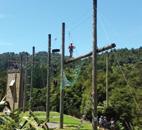

Our aim is that your child comes away with lasting memories of what they have experienced, explored and enjoyed at our camp.
What can you do at camp?
Air rifles, archery, BMX track, sports field, flying fox, indoor climbing wall, bush and stream walking, beach and rock pools, giant hammock, swimming pool, confidence course, low ropes, team building activities, playground area and two trampolines. Plus, our brand new waterslides where you can race your mates or your teacher down our twin water slides.

A wonderful spot
The beautiful 14-acre Camp Raglan campsite is pleasantly situated on the slopes of Mt

Karioi overlooking the panoramic view of Raglan and the Tasman Sea.

Camp Raglan offers a fully catered camp for a total of 150 children and adults in dormitory style accommodation which is particularly suited to primary and intermediate school children.
All the main facilities are under one roof.
Bethel House is an independent building available for hire separately from the main camp buildings.
An information pack to help you with your planning is available from the camp and gives full details of facilities, accommodation and what you need to know to make your booking.
Camp Raglan, 578 Wainui Road Raglan, T (07) 825 8068, campraglan@cbm.org.nz, www.campraglan.org.nz.



Mana Taiohi
(life essence of the young person)
It’s a big job to help steer a young person to success.
There are many challenges facing them financially, timewise, socially, and so on.
At Kokako Lodge (Auckland) we have introduced the fundamental principles of identity (coming from your ancestry through to the personal morality and lifestyle choices you make yourself) and added them to the future pathway options of participation and connection.
We’re only a few months into 2023 but we are seeing huge results from our ‘I am Me – I am Worthwhile’ kaupapa.
Along with our traditional high/ low ropes, archery and raft building, we’ve been making use of our Burma Trail (blind folded following a rope through the
forest). What a great way to face a personal challenge and build connection with your peers!
We’ve also had new people join our team (Teulia, Sione, Emma, and James). The ‘fake blood’ is still coming but you can well imagine the groans our rangitahi will go through finding and rescuing them out of the bush on stretchers!
If you want to really ‘ground’ your students then please email us on Office@KokakoLodge.org.nz and mention you’ve seen this ad for a special deal.
Term 3, 2023 | 53 Learning Space | Outdoor Education Ph: (07) 825 8068 Email: campraglan@cbm.org.nz Website: www.cbm.org.nz Climbing Wall | Low Ropes Course Team Building Activities | Confidence Course Swimming Pool | Archery | Air-Rifles | Orienteering Flying Fox | Table Tennis | BMX Bikes | Volleyball Trampoline | A Developed Playground Area Beach And Bush Walks | 6-Person Hammock Camping Area on a Stream Edge | Sports Playing Field Large Gymnasium | Water Slides OUR CAMP ACTIVITIES: I am me I am worthwhile A time to refocus Help your students get back on track by a change of environment, EOTC and even team building to grow their support structures. Funding available
ask us about funding for active recreation, well-being and leadership.
Lodge (Ak)
Lodge is only 30 minutes from South Auckland. We are
by 17,000
of tranquility,
(high
Word, Reflection Journals, team building
and personal challenge For more information please contact Kokako Lodge on 09 292 4349 or visit www.KokakoLodge.org.nz
Please
Kokako
Kokako
surrounded
hectares
challenge
ropes) and adventure. Spoken
games
“We are seeing huge results from our ‘I am Me – I am Worthwhile’ kaupapa.”
How activity hits all the right notes
Whether it’s club or school sport, sports provide a broad range of benefits to children and adolescents which they can take into their adult lives.

Sports allow children and adolescents to get the physical activity they need to stay healthy while also giving them opportunities to practise soft skills they can take into adulthood.
Still, in spite of the benefits associated with sport participation, 42 percent of young people in New Zealand don’t meet the minimum amount of physical activity per week.

Similar to how young people can carry the benefits of sports participation into adulthood, inactivity can also have longterm effects.
Wide ranging benefits
It’s easy to see the physical benefits of sports. Children and adolescents can get rid of pent-up energy from sitting in the classroom all day while also having fun.
In a single game, a sports participant can utilise multiple muscle groups.
The World Health Organisation (WHO) recommends children and teenagers ages five to 17 do an average of at least one hour of physical activity a day.
Additionally, the WHO suggests that physical activity should mainly be aerobic but also
incorporate muscle and bone strengthening activities at least three days a week. With regular practise and competitions, this is easy to do when you’re a member of a sports team.
Proper muscle development and strengthening exercises are crucial for the prevention of future injures as a young person and as an adult.
Low muscle tone can actually be indicative of a lack of spatial awareness, a soft skill heavily relied on in sports.
Although it’s easy to overlook in the heat of competition, young people also learn and exercise soft skills when participating in sports which are vital on and off the field. Just as muscles, lungs and the heart benefit from regular exercise, so do soft skills.
One of the key soft skills exercised in team sports includes teamwork and conflict resolution.
Both prepare young people for real world situations, teamwork
The World Health Organisation (WHO) recommends children and teenagers ages five to 17 should do an average of at least one hour of physical activity a day.
The WHO suggests that physical activity should mainly be aerobic but also incorporate muscle and bone strengthening activities at least three days a week.
necessitating working with others toward a common goal and conflict resolution involves settling discrepancies in a fair manner; a difficult task when everyone wants to win.
Sports also utilise self-awareness by requiring young people to recognise their own strengths and weaknesses.
By doing this, young people are able to grow in their chosen sport and appreciate the efforts they made in reaching their goals.
Furthermore, playing sports allows young people to practise resilience by providing the opportunity for young people to fail – and realise that it’s not the end of the world.
It’s natural to want to hide our mistakes. However, the visibility of the playing field makes it difficult for mistakes to go unseen.
Although the competitive nature of the game increases tensions, it’s still a safe place for young people to make mistakes and even lose.
Whether young people are playing at a competition or during recess, sports provide young people the chance to work on skills relating to their choice of sport and soft skills which will serve them well into the future.
Barriers to sports participation
According to the University of Otago’s report on the Active Young People NZ Survey, 58 percent of young people ages five –17 meet the guideline of
at least seven hours of physical activity a week.
Groups that were less likely to meet guidelines include girls, secondary school students and individuals living in lowsocioeconomic areas.
When compared to other OECD and EU countries, UNICEF’s State of the World’s Children shows that New Zealand has the second highest percentage of overweight children with nearly 40 percent of children being overweight.
Along with nutrition and diet, physical activity also plays a crucial role in the matter.
For all of the benefits that sports provide children and adolescents, there are still barriers to sport participation.
According to the New Zealand Participation Survey 2019, the three largest barriers for children and adolescents when it comes to increasing sport participation includes preferring other activities instead sport, lack of energy and being too busy.
Changing young people’s idea of a good time is an uphill battle many caregivers and educators are all too familiar with.
More and more, screens compete for our attention. According to the New Zealand Health Survey 2019/20, nearly 80 percent of children aged two–14 watched screens for two hours or more a day.
Nonetheless, of all the barriers listed in the survey, busyness was the number one barrier preventing children from increasing sport participation. Even so, this is one barrier caregivers and educators can help students with the most.
Considering the far-reaching benefits of sports participation and the roles caregivers and educators have in the lives of their students, it’s important that adults in charge of young people’s schedules prioritise sport and clear some time for it on a regular basis.
54 | Term 3, 2023 Working Space | School Sports Brand New Access it here netballnz.co.nz/netball-nz/community Secondary School Netball Guide
Action Indoor Sports

Waitakere is located at Unit 5, 133 Central Park Drive in Henderson.
We specialise in providing social indoor netball leagues as well as offering indoor soccer and indoor cricket leagues.
Action Waitakere was established many years ago and is well known to all the locals in West Auckland. John & Julie Bywater acquired the business in December 2013 and, since then, have given the whole place a much-needed facelift and have implemented positive changes, with much more to come over the next few years.
The arena has excellent facilities, including four playing courts designed for Indoor Netball, Indoor Soccer and Indoor Cricket, with all equipment supplied plus a fully licensed bar and BBQ
area that is available for your after-match entertainment, where you can enjoy a drink with family and friends. There is ample off street parking, loads of spectator seating and full change room amenities.
Action
Indoor Sports Stadiums are the most modern and professionally administered indoor sports venues of their type in New Zealand.
Action Indoor Sports Stadiums are the most modern and professionally administered indoor sports venues of their type in New Zealand. Professional staff using state of the art technology and sports

management software ensures your leisure time experience is enjoyable. We have graded competitions, ladies and mixed, that are suitable for ages 12 years through to 60 plus as well as offering one off events
Looking forward to seeing you soon!
Indoor Netball | Indoor Soccer | Indoor Cricket Action Indoor Sports Waitakere Ph 835 2242 Other services we offer are: Court and Venue Hire Sports Trainings & Practices Kids Birthday Parties Stag/Hen’s Parties Fully Licensed Bar Work Functions/ Team Building Exercises West Auckland’s No.1 Indoor Sports Arena 5/133 Central Park Drive, Henderson waitakere@actionwaitakere.co.nz www.actionindoorsports.com/waitakere Action Waitakere
to
for
– the place
play! great place, good times, team fun
everyone!
i.e. Casual Court Hire, Sports Birthday Parties, Company Bookings and Group Bookings.
Youth vaping how schools can respond
During the past two decades in Aotearoa, studies have consistently shown young people’s overall use of alcohol and drugs is declining. However, bucking this trend is the rapid growth in the popularity of vaping.
According to a 2021 survey by Action on Smoking and Health (ASH) NZ, the number of daily vapers in NZ rose from 3.1 percent in 2019 to 9.6 percent in 2021.


For those aged 15-17, the number of daily vapers tripled in two years, from two percent in 2018-19 to six percent in 2020-21
While risk-taking and experimenting are normal for young people, the uptick in the number of young vapers and widespread availability of vaping products near schools have understandably concerned many parents and educators.
On the positive side, the increase in vaping has contributed to
a decrease in the number of people who smoke, which is a more harmful behaviour.

The number of daily cigarette smokers in New Zealand is currently 8.0 percent, down from 16.4 percent a decade ago.
Broad trends aside, a smaller number of young people continue to use substances in ways that are harmful. The Youth19 survey identified several risk factors for substance abuse among rangatahi, including sexual abuse, racial discrimination and experience of family violence.

Addressing the drivers for these behaviours, particularly inequitable educational outcomes is crucial.
How Vape Detection works.
1. Vape detectors use a combination of sensors to detect airborne particles in the air.
Vape Detection Specialists.
We specialise in supply and installation of vape detection systems across Auckland, NZ.
2. When a person vapes, the device releases particles into the air, including smoke, vapor, and aerosol.
3. The sensors in the vape detector detect these particles and analyze their composition.
4. If the particles are consistent with those produced by a vaping device, the vape detector will trigger an alarm or notification.
5. The alarm or notification can be sent to facility managers or security personnel, allowing them to respond quickly to the situation.
6. Some vape detectors also include real-time monitoring capabilities, which allow facility managers to track vaping activity over time and identify problem areas.

56 | Term 3, 2023 Health & Wellness | Vaping
Vape Detectors for Schools | Vape Detectors for Hospitals | Vape Detectors for
Workplaces
021 023 26040 ben@vapedetection.co.nz vapedetection.co.nz
Insights from “Protect Your Breath” campaign
Te Whatu Ora’s “Protect Your Breath” campaign, based on a national survey of young people, offers insights into how schools can respond to youth vaping.

For most young people who try it, vaping is simply driven by curiosity, similar to other risktaking behaviours. For a smaller number, vaping can serve as a coping mechanism or way to emotionally regulate however, it could cause problems for their mental health and social wellbeing long term.
Therefore, the way a school reacts to vaping can significantly impact the way young people view themselves and their future educational and health outcomes.
Punitive approaches are ineffective
Keeping young people in school is crucial, and sometimes how adults respond to issues like vaping can do more harm to a rangatahi than the act of vaping itself.
Punitive approaches, such as punishing or lecturing students caught vaping, are not effective in changing behaviour.
Instead, schools need to implement evidence-based strategies that promote health across a student’s lifespan, with a focus on supporting young people to remain in school.
Tūturu promotes positive relationships, creating a safe and inclusive environment, and fostering critical thinking skills. At their best, schools can help young people navigate complex health issues and promote positive outcomes for all students.

In 2020, an independent evaluation found Tūturu supported schools in changing their focus from punitive to pastoral.
Focus on the environment, not the individual Blaming students for problems they did not create is counterproductive. Young people, like us all, are products of their environments and need support to make healthy choices.
Takiri Mai te Ata Regional Stop Smoking Service regional manager, Catherine Manning emphasised that adults should take responsibility for the problem.
“Let them [young people] not be the ones who are blamed for it, don’t stigmatize them, don’t steal their future.”
An evidence-based approach Aligning with both a system approach and ensuring young people are prepared for a modern world where alcohol and drugs exist.
Tūturu offers an evidence-based approach that schools can use to respond to youth vaping. Tūturu aims to bring health and education into a partnership to prepare young people for a modern world where alcohol and drugs exist.
It has four main areas it works with schools to achieve this goal: developing policy and procedures, developing school-wide pastoral pathways, professional learning and development for the school (including BOT and staff), and finally, curriculum resources for Years 9-13 that align with NCEA.
Youth vaping is an emerging health issue that requires schools to respond in healthy and multifaceted ways.
With the right support and resources, schools play a crucial role in promoting the health and wellbeing of young people, and ensuring that they are equipped to make informed decisions about their health and wellbeing.
To find out more, visit Tuturu. org.nz and look out for Tūturu staff at the Principals’ Federation Conference in September.
Health & Wellness | Vaping A modern approach to student wellbeing. This includes policy, pastoral care, professional learning, and curriculum resources for students Years 9–13. Visit tuturu.org.nz to learn more. We bring
and education
an evidence-based
your
health
together, to develop
approach for
school.
Tūturu aims to bring health and education into a partnership to prepare young people for a modern world where alcohol and drugs exist.
Is your skin in check?
Our sun is harming us! New Zealand has the highest rate of melanoma in the world with around seven Kiwis diagnosed every day. Around 350 Kiwis die from it every year – that’s more than our annual road toll. Melanoma is fast-growing and the most life-threatening of all skin cancers. It’s also hard to detect with an untrained eye.
MoleMap’s proven skin mapping system, developed exclusively by MoleMap, is designed to look deep inside a moles structure to detect any potential skin cancers that can’t be seen with visual checks. Over 250,000 patients have chosen MoleMap and over five million moles have been checked so far.

Regular, expert skin screening is a very simple way to reduce these statistics. Just as most of us have other annual health check, getting your skin mole-mapped every year or two is essential – especially if you’re fair-skinned, have a lot of moles, have a family or personal history of skin cancer, have been sunburned in the past, or have an outdoors lifestyle.
MoleMap
– your skins best chance
Pioneered by a group of Kiwi dermatologists, MoleMap is New Zealand original skin-mapping service. Recognising that many
moles were being diagnosed inaccurately because of a lack of technology, our founders created MoleMap nearly 25 years ago: the unique skin-mapping system that’s designed to track changes in the skin over time. Today, MoleMap has over 50 clinics across New Zealand and Australia, and our technology is used for skin cancer detection around the world.
MoleMap’s proven system combines the latest technology with head-to-toe skin mapping by specialists Melanographers (accredited skin cancer nurses) and expert diagnosis of any suspicious moles by expert dermatologists.
MoleMap knows that early melanoma detection offers a nearly 100 percent chance of survival within five years – that’s why it’s always worth checking. Plus, with MoleMap, you get fewer scars and fewer scares. This is because MoleMap can more accurately identify melanoma,
there is less need to surgically remove benign (harmless) moles.
Gore Health
– Southern’s MoleMap Experts
Gore Health holds the MoleMap franchise from Ashburton South - and now with a new clinic in Rangiora - with nine Melanographers around the region to ensure our patients can easily access our clinics.
MoleMap appointment are available in Ashburton, Timaru, Dunedin and Invercargill weekly. Clinics are also held regularly in Oamaru, Fairlie, Twizel, Balclutha, Gore, Queenstown, Clyde and Wanaka.
What’s more, our Melanograpghers are also experienced working with businesses to provide MoleMap skin screening and education to their staff as part of their workplace wellness programme – either onsite or we can provide vouchers so your staff can visit our clinics.
You can check your skin cancer risk level at www.molemmap. co.nz/myrisk . To book an appointment, see www.molemap.co.nz or call us on 0800 665 362 No referral is necessary; if you’re worried about a mole, go and get it checked.

Are you at risk of melanoma?
Did you know that New Zealand has the highest rate of melanoma in the world? Every day, around 7 New Zealanders are diagnosed with melanoma - it’s the most serious form of skin cancer and it can quickly become deadly.1,2
That’s why MoleMap’s proven skin-mapping system is designed to detect skin cancers such as melanoma early – when it’s most treatable.3
We check. And double-check.
With MoleMap you get two sets of expert eyes examining any moles of concern: a trained Melanographer and an experienced specialist Dermatologist.

Fewer scars.
Fewer scares.
Because MoleMap can more accurately identify melanoma, there is less need to surgically remove benign (harmless) moles.1
Early detection makes a difference.
Early melanoma detection offers a nearly 100% chance of survival within 5 years.? That’s why it’s always worth checking.
0800 665 362 | molemap.co.nz
References: 1. Health Promotion Agency and the Melanoma Network of New Zealand (MelNet) 2017: New Zealand Skin Cancer Primary Prevention and Early Detection Strategy 2017 to 2022. 2. https://www.melanoma.org.nz/facts-risk-factors
https://www.melanoma.org.nz/early-detection
3.
Serving up the good stuff
Fun themes for your canteen
With a little creativity, theme days can be a fun and cost-effective way to encourage healthy foods.
Changing up the regular menu will generate excitement among students and keep them interested in what’s on offer.
Canteen theme days provide a way of celebrating special occasions, trialling different foods and promoting new menu items. It’s also an opportunity to seek valuable feedback from your customers.
Coming up with a theme idea is the easy part, but how can you help ensure the day is successful?
• Plan well in advance and promote widely
• Consider the aim of the promotion – is it to trial a new product, encourage vegetables and fruit or to increase menu variety?
• Be sure to order enough food to prevent selling out. Pre-orders can help with forecasting numbers
• Get the students involved during the planning and implementation. Find out what themes or popular foods will interest them. There may be opportunities for art or design students to help develop advertising material or decorations
• Decorate the canteen or dress up to create a buzz.
So what healthy, yet tasty foods can you provide that still make a profit?
Here are five ideas - but the possibilities are endless and it pays to be imaginative! Visit the Fuelled4life website to find all these recipes and many more.
Winter soup day
A mug of soup is the perfect way to warm up during the cooler months. It’s also a great way to include vegetables on your menu. Mix up the flavours on a regular basis so your customers don’t get bored.
• Creamy vegetable soup
• Lentil soup (lentils are a cost-effective, protein-rich ingredient. A great addition to vegetarian soups).

• Chicken and corn soup.
Chinese New Year
Chinese New Year is an important Chinese festival surrounded by festivity. Why not join in the fun by adding a healthy twist to these traditional Asian recipes?
• Dumplings
• Coriander wraps
• Vegie noodle stir-fry.
Heart Day
Heart Day is part of the Heart Foundation’s Annual Appeal, held in February each year. Use red, heart-healthy foods to create awareness and highlight the importance of a healthy heart.
• Fresh tomato and capsicum pasta sauce (serve with wholemeal pasta and vegetables)
• Berry-licious smoothie
• Beetroot and feta summer salad.
Vegetable/fruit of the week
Find exciting ways to promote a different vegetable or fruit each week based on what’s in season.
• Watermelon & cucumber salad
• Chicken and apple meatballs
• Roast carrot dip and spinach wrap.
A taste of India
An opportunity to introduce vegetarian protein sources into your menu like chickpeas or other legumes. This theme works well for terms two or three to keep warm on a winter’s day.
• Butter(less) chicken
• Dhal
• Mild lamb curry.
Sign up to Fuelled4life
One in three Kiwi kids is overweight or obese but you can help change that.
If you are a teacher, principal, canteen manager, caterer or cook and would like to see your school offering healthier food and beverages, sign up to Fuelled4life for many free resources to help you choose healthier options. You’ll also get free access to the Fuelled4life website and newsletter with tips, recipes, special deals and information on ways to improve nutrition in your school.
For more information or one-to-one nutrition support, please contact the Fuelled4life team on (09) 526 8550, email fuelled4life@ heartfoundation.org.nz or go to fuelled4life.org.nz.

60 | Term 3, 2023 Health & Wellness | Tuck Shops
FEEDING LEARNERS HUNGRY GREAT FOOD
Healthier food options for New Zealand’s hungry learners.



• Top quality, freshly made lunches for learners.




• On-site or delivery service, tailored to suit you.

• Professionally audited food control plan.
• Trained, qualified, local staff.

It’s simple: Let our professionals feed hungry students, while your professionals feed hungry minds.

BE PART OF THE JOURNEY. LET’S TALK. +64 21 709 138 | www.libelle.co.nz
APPROVED LUNCH SERVICE SCHOOL PROVIDER
Staying safe
Health and safety strategies play a large role in the day-to-day functionality of modern-day classrooms and schools.
There is much to consider in regards to health and safety in the classroom to ensure staff and students are safe and comfortable in their environment.
The Ministry of Education (MOE) has many resources and information pages which can provide teachers and kura with informative explanations on how to handle almost any situation.
Some of their resources for health and safety in schools include guidance for setting up a healthy and safe environment for students who may have been diagnosed with a health condition, severe allergies, cancer, or even a brain injury.
Ensuring that good enrolment procedures and records are
taken during initial meetings with new students is crucial to protect the school for any health or wellbeing risks.
Establishing clear communication between staff in regards to locations of emergency kits, as well as relevant training required, will mean during an emergency correct procedure will be followed.
The MOE says a clear conversation between staff and whānau is needed for administering medications, sharing details and communicating with staff and other parents about health conditions (if needed) is important.

Give your best self to work and your best self to your family.
The people you go home to have just as much right to your best self as the people you work with.
For some learners a detailed health plan is needed between whānau and the school. “Every learner’s response to an experience of a health condition is different.

“The impact on a learner’s hauora and learning will depend on many factors and will change over time,” says the MOE. The MOE suggests some learners may make leaps and others may experience set-backs due to potential health conditions.
Vitae
Burnout is the result of prolonged work-related stress.
It is a state of physical or emotional exhaustion that involves a sense of reduced accomplishment and loss of personal identity. It’s a mixture of exhaustion, cynicism, and ineffectiveness. Job burnout can result from various factors, including:
Lack of control an inability to influence decisions that affect your role, or a lack of resources.
Unclear job expectations being unclear about the degree of authority you have or what others expect from you.
What’s important to you?
Do you need strategies to get the best out of life?
Speak in total confidence to a Vitae counsellor –call 0508 664 981 24/7 to make an appointment or book online at www.vitae.co.nz/contact/counselling-form/

Difficult workplace dynamics feeling undermined by colleagues.
Extremes of activity a job that requires constant energy to remain focused.
Lack of social support feeling isolated at work and in your personal life.
Work-life imbalance your work takes up so much of your time and effort that you don’t have the energy to spend time with your family and friends.
Helpful tips:
Symptoms of burnout can range from physical to mental and emotional, affecting all areas of your life and work. Before symptoms grow worse, here’s what yo u can do to address the situation…
• Set boundaries on work.
• Try to set goals for what must get done and what can wait.
• Take your breaks and leave.
• If you’re sick, stay home.
• Open up and be honest about what’s bothering you.
• Have a healthy diet, sleep and exercise regime.
• Try a relaxing activity.
• Practice mindfulness.
• Schedule downtime.
• Seek support – whether that’s with a trusted colleague, a friend or loved one, or a workplace counsellor.
62 | Term 3, 2023 Health and Safety | Risk Management
“To ensure a healthy and safe environment for ākonga, staff and whānau, there needs to be good systems and processes in places for managing risks and hazards.”
Checking in often with students and gently supporting growth is positive. Outlining realistic expectations is one way to demonstrate successful health and safety strategies.

Promoting healthy lifestyles is another aspect to health and safety according to MOE. Healthy Active Learning is a voluntary initiative established by the MOE. The programme is free of cost and contributes to one of the Government’s key priorities - improving the wellbeing of children and young people.

Managing risks and hazards in the school environment is a significant part of health and safety.


“To ensure a healthy and safe environment for ākonga, staff

and whānau, there needs to be good systems and processes in places for managing risks and hazards,” the MOE says.
To ensure staff and students will be safe during an emergency, establishing clear communication between whānau and kura will mean resolving a situation will be as smooth as possible when needed.
Having conversations with families and referring to resources provided online when needed means you will be prepared for most emergencies if they arise.
To find out more about health and safety in schools, make sure to visit: education.govt.nz.

Health & safety, sorted? Hasmate makes it easy for boards and schools to meet H&S responsibilities and requirements 30 DAY FREE TRIAL hasmate.co.nz/schools Health and Safety | Risk Management
Promoting healthy lifestyles is another aspect to health and safety according to MOE. Healthy Active Learning is a voluntary initiative established by the MOE.
Water worlds
Seeking understanding of our oceans
The founders of Education Perfect, Shane and Craig Smith, have always sought to influence positive change.
Their new focus has become the ocean, with Craig qualifying as a scuba diving instructor, and Shane developing an interest in underwater photography –experiences that have opened their eyes to the importance of sustainability in our oceans, and just how crucial it is to act before the damages are irreversible.
“We believe that educating students on the importance of sustainability is critical for creating a sustainable future,” they say.
“Our free lessons on sustainability cover essential topics, such as the impact of a changing climate, how to manage the Earth’s
resources responsibly, and the relationship between ecosystems, biodiversity, and human activity.
“Animals, Oceans and Us is a free set of resources that provides a curriculum-aligned approach to educating students on key environmental issues such as animal rights and ocean conservation.
“These lessons encourage critical thinking and support schools’ cross-curricular priorities, ensuring that sustainability is integrated into all aspects of education. These resources are designed for Years 7 - 10 across Australia and New Zealand, and affirm our commitment to making a positive impact on the environment through education.
Empowering the next generation School-age students today are acutely aware that the world they’re inheriting is not the world
that their parents grew up in. This has led to a range of reactions, from the palpable anger expressed during the 2018 climate change protests to an ongoing background “climate anxiety”.
“We wanted to give students both the knowledge that they need to understand the range of issues facing our oceans, and also a set of proactive steps they can take to minimise their footprint

on the oceans. To achieve this, we’ve partnered with Education Perfect along with teachers in Australia and New Zealand to deliver a set of lessons focused on Sustainable Oceans.”
The lessons will be made freely available to all students in Australia and New Zealand.
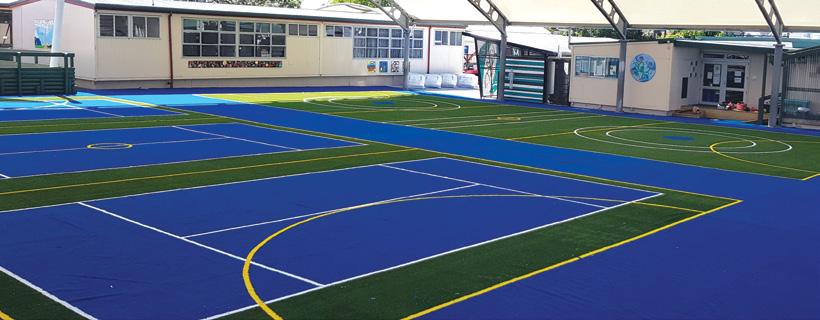

“We want students to walk away feeling empowered rather than thinking the situation is hopeless (which it isn’t).
A carbon free future
You will be aware of the increasing climate concerns surrounding the use of coal and other fossil fuels.
The Government is committed to taking New Zealand towards a carbon free future where the use of fossil fuels is diminished. Taylors Manufacturing manufactures new boilers, or can convert any existing Taymac boiler, (or any boiler using a Taymac or Taylors coal stoker) to operate on wood pellets.
In Canterbury, the replacement or conversion of coal fired boiler plant to biomass operation is so well established that for installations up to 1MW, ECan (the regional authority) will usually permit conversion with no further need for a resource consent.
If your present boiler really has reached the end of its operating

life, then the most economical replacement alternative is a new Taylors biomass boiler. It will bolt into place with no need to modify the existing installation. Typically, a ‘like-for-like’ replacement is around half the cost of the alternatives.

If the boiler is still in reasonable order, then, in most cases a conversion is relatively easy and by far the most economical route to biomass.
Even though your boiler plant may be old, provided that it is in adequate condition now, when converted it will be good for many years to come. Quite apart from the updates to the fuel feed and control systems, operation on biomass is considerably more benign to a boiler than is coal. Many boilers 30 years old or more have been converted to operate on wood pellets and continue to operate reliably and without difficulty.
64 | Term 3, 2023 Learning Space | Sustainability A LEADING PROVIDER OF TAILORED WITH 100 YEARS OF EXPERIENCE
03 389 7149 0800 829 622 Industrial Fans | Hot Water Boilers | Emissions Control Equipment Grates & Castings | General Engineering Taylors Manufacturing Ltd. 19 Taurus Place, Bromley PO Box 19757, Woolston, Christchurch, New Zealand sales@taylorsmfg.co.nz www.taylorsmfg.co.nz
SOLUTIONS ENGINEERING
per m
Urban Turf is an excellent solution for schools looking to create safe, low-maintenance outdoor spaces and multisport surfaces.
With its realistic appearance and durable construction, it provides a perfect playground surface. Our multisport turf range is ideal for new sports courts and fields or the replacement existing ones.


Urban Turf Artificial grass eliminates the need for constant watering, mowing, and fertilizing, which can be timeconsuming and costly.

By installing Urban Turf, schools can save money on maintenance costs, reduce the risk of injury, and create a beautiful outdoor area that encourages students to engage in physical activity and outdoor play.
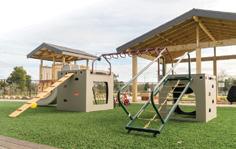

2
all sports courts until December 2023 0508 872 268 urbanturfsolutions.co.nz North Island 42b Porana Road, Wairau Valley, Auckland 0627 South Island Unit 6, 67 Barnes Road, Casebrook, Christchurch 8051 Contact us Made in Australia New Zealand-wide installers From concept to completion Why choose us Transform your
space
$1
rebate On
school’s outdoor
Stratford is for learners!
With a spectacular heritage trail, stunning parks and gardens and countless opportunities to explore the landscape and history, Stratford offers a lot to see and do for all ages.

We’re a playground for literary lovers with our Shakespearean links throughout town.
Discover the hidden treasures and stories Stratford has to tell on the Discovery Trail, check out our galleries, cafes and recreational amenities.

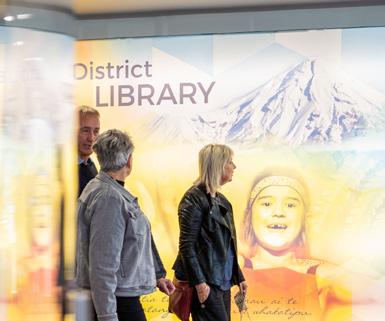

Outside of town, Stratford offers the best access points to Taranaki Mounga and is the gateway to the Forgotten World Highway and the famous Republic of Whangamomona. Learn something about yourself and your surroundings in the heart of Taranaki.
Visit our modern and resourceful Library and isite Visitor Information Centre for everything you need!
06 765 5403 stratford.govt.nz



We offer our friendly service and are happy to help out! Painting Plastering Wallpapering Renovations CALL US 027 229 4421 /Dyerdecorating
Clearing the air
Making sure indoor spaces are well ventilated and have lots of fresh air is recommended for schools.

The best way to maximise ventilation is to open all windows and doors as much as possible, and whenever it is practical to do so.
The exception to this is spaces that are fitted with ducted air conditioning systems (excluding heat pumps), which do not rely on opening windows to bring in fresh air.
Ventilation in winter
Air flow behaves differently at different temperatures –for example, the bigger the temperature difference between outside and inside, the more efficiently fresh outside air is drawn in through open windows.
This means ventilation can work better during cold weather, so you can still achieve good ventilation with windows just partially open.
There are several ways to do this depending on your school’s design, how each space is being used and the outdoor conditions.
Ventilation guidance
A space’s ventilation will be influenced by how it was designed, how it is currently being used, and the outdoor conditions.
Good ventilation will provide fresh, clean air while maintaining comfortable temperature and humidity levels for the people in the space.
Indicators that a space may not be well-ventilated include a feeling of stuffiness, lingering smells and elevated CO2 levels created by the people in the room.
When this is occurring, schools should also consider increasing the use of other measures such as face coverings and physical distancing.
You can quickly improve the air quality in any space by:
• Limiting more vigorous activities, or moving them outdoors or to a better ventilated space
• Limiting the number of people, especially in smaller, confined spaces
• Fully opening all windows and doors to flush the air in the

room, and where it’s an option to do so, briefly vacating the room at the same time.
Guidance for ducted, mechanically ventilated spaces

Some schools are fitted with ducted mechanical ventilation systems that automatically source fresh air from the outside while also managing the temperature of the room.
These are often referred to as HVAC or air conditioning systems. This doesn’t include heat pumps, because they don’t supply fresh air.
68 | Term 3, 2023 Property | Ventilation P: 09 634 5780 | E: info@metropolitanair.co.nz www.metropolitanair.co.nz
us for a free audit to improve the indoor air quality (IAQ) at your school.
Call
Good ventilation will provide fresh, clean air while maintaining comfortable temperature and humidity levels for the people in the space.
One way to identify if your space has a ducted mechanical ventilation system is to look for vents in the ceiling that bring in fresh air or extract old air. Where ducted mechanical ventilation systems are fitted, the above advice for naturally ventilated spaces doesn’t apply unless the system has specifically been designed to work in conjunction with windows and doors being open.
If not, windows and doors should remain closed to allow the system to work as designed. A well-configured ducted mechanical ventilation system will provide good ventilation while managing indoor temperatures. Make the most of this by:

• Ensuring the system is regularly checked, cleaned and maintained by an appropriately skilled technician
• Having the system configured to come on at least two hours before and after the school day
• Increasing the amount of fresh air brought in by the system and minimising the amount of old air it filters and recirculates
• Continuing to use your portable CO2 monitors to check if the system is working effectively.
Guidance for using heat pumps and other heating systems
You can continue to use heat pumps to heat or cool spaces, even when windows and doors are open.
Heat pumps and most other heating systems only heat or cool recirculated air within the space. They do not bring in fresh air, so to achieve good ventilation they must be used alongside a means of providing fresh air.
When using heat pumps and other heating systems:
• Pre-heat the space to a comfortable temperature before the school day to improve the draw of fresh air through partially opened windows
• Increase indoor heating or cooling during the day, if you need to, to offset the impact of having the windows open
• Resetting the temperature of the room to a comfortable level after it has been vacated and aired out, by briefly closing all windows and doors and running the system on its highest setting before re-occupying the room and re-opening windows.
Passive ventilation solutions Aerovent, Sashvent and Ventient

Ahead of the colder months, your heat pump or heating system should be checked and serviced to make sure it is running at its best.
Using a heat pump with windows open will be less efficient and may incur some additional power costs.
Information sourced from:
www.temahau.govt.nz.
Te Mahau is a part of Te Tāhuhu o te Mātauranga The Ministry of Education
Property | Ventilation
aplnz.co.nz APL products are exclusively available from our manufacturers nationwide
Introduces fresh air into the building envelope Makes rooms healthier, by improving air quality Easier and more efficient to heat, reducing energy consumption.
Keeping your classrooms healthy on the inside
Maintaining solar systems


Approval process
If the school is considering purchasing or replacing solar panels through their 5YA funding, note that they are a priority item in their 10 Year Property Plan (10YPP).
Ideally, they would be installed after basic energy efficiency improvements have been completed.
This is important as energy efficiency initiatives generally deliver more costeffective energy gains and carbon reductions than solar installation projects. You may choose to purchase and own solar panels at your school, or you may enter into a lease arrangement with a solar provider who will continue to own the panels.
In either case, you should speak with your Ministry Property Advisor before installing solar panels.
They would only be funded through 5 Year Agreement (5YA) funding, after all priority one-three items have been completed.
Solar panel installations require that the school’s Ten Year Property Plan (10YPP) is amended in agreement with the Ministry.
This is because most solar panel installations have an impact on a school’s existing infrastructure.
Installation
The Ministry requires that all solar panels are installed by the Sustainable Electricity Association of New Zealand member installers to ensure compliance with all relevant standards and requirements.



Roofing materials for school buildings
Have you considered the remaining life of the roof and any added expense and risks if solar panels need to be disconnected and re-installed if the roof requires replacement?
• Consider having your roof evaluated to make sure it can withstand solar panel installation
• Consider your roof’s remaining life, including whether your
roof is currently included in the project list on your school’s 10YPP for maintenance works
• Undertake the required repair/ maintenance/replacement before installing the solar panel. This will avoid the costs in the long run associated with removing and reinstalling the solar panels on the roof. Information sourced from the Ministry of Education:
www.education.govt.nz.

Smart energy for your home or business.
High quality solar energy systems installed by experts. Whether you are looking to improve your businesses sustainability credentials, add value to your house, reduce your carbon footprint, or simply take control of your energy bills, CPS Solar Christchurch will design and install the best system for you, customised to meet your needs.
70 | Term 3, 2023 Property | Solar Energy OUR VISION IS TO BE RECOGNISED AS A PROVIDER OF EXCEPTIONAL QUALITY. 3 Quality and reliability. 3 Proactive and creative. 3 Dynamic and flexible. We pride ourselves in delivering a personal and professional service, in and around the Bay of Plenty and Marlborough Region. Our team are committed to providing a quick and efficient response to requests for quotations for all Domestic, Commercial and School projects. We are extremely proud of our client retention rates and the significant volume of repeat business that we benefit from year on year. Phone: 07 549 1916 Email: admin@stottselectrical.co.nz www.stottselectrical.co.nz
COMMERCIAL SOLAR GRID-TIED SOLAR HYBRID SOLAR OFF-GRID SOLAR Join the solar revolution. 0800 277 548 | info@cpssolar.co.nz | cpssolar.co.nz E Q C
Solar systems are most suitable for installation when they are part of a school’s sustainability and/or energy efficiency programme.
Professional Soft Washing Solutions.
The team at Absolute Housewash are passionate about providing our customers across the greater Wellington region with amazing service and the highest quality workmanship possible.

Why is it important to wash my house regularly?
Washing your house regularly means that dirt, grime, salt and mould don’t have a chance to build up and damage your paintwork and your cladding. Keeping on top of the buildup reduces the chance of costly repairs to your asset.
Washing the exterior of your home not only extends the lifespan of your paintwork, but it keeps it looking new and saves you money in the long term.
We strive to deliver outstanding results that leave our clients delighted. We have over 20 years’ experience in the exterior cleaning industry and in that time, we have developed very effective methods such as our soft washing technique which loosens and removes any build-up without using harsh pressure for cleaning all surfaces and all types of properties, with the smallest environmental impact possible.
We know how important a well-maintained roof is. Using our soft wash technique, we can remove all build-up without damaging your home and will get your roof sparkling. Finishing with a preventative treatment which slows down the growth of mould and dirt in the future and keeps your roof cleaner for longer.

Whether you have a deck to clean, a family home or a multi storey commercial property, we have the equipment and the know-how to complete the job to the highest standard.

Integrity, honesty, reliability and punctuality are at the forefront of our business philosophy and as testament to that, much of our work now comes by way of referral or repeat business.
We would love to work our magic on your home or commercial property and can provide you with a free quote. Visit our website www.absolutehousewash.com and fill out the quote request form. We will be in touch quickly to talk about what you need. Alternatively, call us on 027 572 0091.
OUR SERVICES:
Water Blasting Gutter Cleaning Roof Cleaning Exterior Cleaning Path Cleaning Commercial Building Cleaning
P: 027 572 0091 E: wade@absolutehousewash.com www.absolutehousewash.com RESIDENTIAL AND COMMERCIAL
Based in Christchurch, CKC travels the South Island providing quality products and services to their many customers, including schools. We offer kerbing, paving, and all concrete finishes including infill using colour and stencilling. We also have full excavation services.




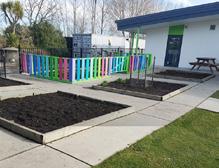

SCHOOL PROJECTS INCLUDE:
Haeata Community Campus

• 500m of coloured, integrated panels in a curved quadrangle.
Boxed gardens and pathways
• 1800m of kerbing with an intricate swale drain system.
Kaiapoi North School
• 150m boxed garden area, 650m plain concrete accessways.
Spreydon School
Pathways and landscaping
All concrete types, including:
• Plain
• Coloured
• Exposed Aggregate
• Stamped
• Infill using colour and stencilling
Kerbing 2

• 900m black concrete, 300m mowing strips.
Cashmere Primary School
• 300m steps and ramps, 400m kerbing.
Addington School
• 380m plain concrete, 300m kerbing.
Pathways and carparks
Walkways and play areas
Phone: 0800 024 220 | Email: info@ckc.nz | Web: ckc.nz/schools
Kerbing and swale drain Coloured concrete 2 2 2 2 2 2
Outreach with Libraries Horowhenua
Libraries for Children and Young Adults are essential for information and development.

Outreach to our local schools improves student access to reading resources, services, and programmes. Collaborating also helps us to respond to curriculum needs.
It creates strong authentic relationships with librarians, teachers, students and whānau and supports reading for pleasure at home and during the holidays.
Outreach Services
Library talks
Storytime
Archive explorer
Kete Horowhenua tutorials
Digital inclusion
Curriculum support and resources
info@horowhenua.govt.nz

06 368 1953
te.takere
tetakere.org.nz
Sustainable hot water and heating solutions
 By Natasha Parrant
By Natasha Parrant
Apricus Eco Hot Water and Heating delivers sustainable and renewable central heating and hot water nationwide since 2014.

The team designs and installs environmentally friendly central heating systems and hot water for homes, businesses, schools, and anyone else who’s interested.
They install boiler conversions in schools as it positively impacts tamariki. A boiler creates heat and provides central heating.
The ÖkoFEN pellet boiler technology has been operating since 1989 and is automatic, so it’s easy to use.
It starts at night and brings the school up to the preferred
temperature and then slows down as the temperature gradually warms up, Apricus Eco Hot Water and Heating managing director and lead designer Marcus Baker says.
The way pellet boilers work in schools is it heats water, which then gets circulated around the school and radiated. The classrooms are heated by radiators, which keeps the classrooms warm in the winter, he explains.
The company wants to remove every fossil fuel boiler in Aotearoa and aims to decrease people’s environmental impact by providing alternative systems and design advice on energy efficiency. For instance, at schools to ensure tamariki are warm and comfortable.
“We don’t see why that should be done in a way that harms the environment.
“When you’re burning fossil fuels you’re contributing to greenhouse gases, which contributes to the climate crisis. So, we’re replacing those fossil fuels climate crisiscausing boilers with renewable sustainable pellet boilers.


“This means there’s a 99 percent reduction in greenhouse gas emissions compared to a coal boiler and it also cleans up the local air quality as well.”
The eco-friendly pellet boilers are really convenient. They’ve got remote monitoring, so the principal, caretaker or property manager have an app on their phone to see what the temperature is at any time and can adjust the timing.
So far, the company has installed sustainable boiler conversions in 16 schools and will do the same for 11 schools before next winter, which gets installed from Auckland all the way to Invercargill.

Photos kindly supplied by Apricus Eco Hot Water and Heating.
Apricus Eco Hot Water and Heating 2/2 Hynds Road
Gate Pa
Tauranga
(07) 312 3382
info@ecohotwater.co.nz
ecohotwater.co.nz

Property | Boilers
Netherton School students standing beside the efficient ÖkoFEN boilers.
KWB PELLETFIREPLUS

PELLET HEATING SYSTEM


45 – 135 kW
The boilers can be used for underfloor heating, radiator heating, hot water heating and swimming pool heating. They produce 90% less ash than a coal boiler, and the ash is BioGro certified as an organic fertilizer. They are self-cleaning and can be controlled over the internet.


0800 4 5353548 | www.kwb.net | www.kekelit.co.nz ROBUST AND ECONOMICAL HEATING INDUSTRIAL QUALITY RENEWABLE ENERGY
Initial Teacher Education Qualifications
Open Polytechnic | Te Pūkenga
Unlock the potential of your community with these transformative programmes. Open Polytechnic Initial Teaching Educations offer a comprehensive approach to teacher education, allowing learners access to flexible online, anytime learning combined with the support of a partner school. Learners will graduate the programme work-ready and equipped with the skills and knowledge required for teaching positions. Enrolments are open now.
Graduate Diploma in Teaching (Primary Education) (Level 7)
Designed to build on the existing skills and knowledge that ākonga bring, this programme focuses on enabling ākonga to engage with the New Zealand Curriculum and develop their understanding of learning and development theory.


Bachelor of Teaching (Primary Education)
Ākonga have the opportunity to engage deeply in each of the curriculum areas as well as develop their understanding of learning and development for tamariki and rangatahi, and their critical thinking skills. They will also have the opportunity to develop their reo Māori in an ongoing way throughout the programme.
Visit
Graduate Diploma in Teaching (Secondary Education) (Level 7)
Designed to build on the existing subject skills and knowledge that ākonga bring, this programme focuses on enabling ākonga to engage with their specialist area of the New Zealand Curriculum and develop their understanding of learning and development theory.
Graduate Diploma in Teaching (Secondary Technology Education) (Level 7)
Designed to build on the existing technology subject skills and knowledge that ākonga bring, this programme focuses on enabling ākonga to apply these skills and knowledge to the New Zealand Curriculum, and develop their understanding of learning and development theory.
our website to enrol online www.openpolytechnic.ac.nz or call 0508 650 200
New Initial Teacher Education model opens opportunities to serve local communities
New Initial Teacher Education model opens opportunities to serve local communities
A new suite of Initial Teacher Education (ITE) programmes offered by Open Polytechnic | Te Pūkenga, is increasing accessibility for ākonga across the country, enabling them to complete a qualification without having to travel outside of their local area. Early feedback suggests the new model for delivery of ITE programmes is meeting an important demand.
A new suite of Initial Teacher Education (ITE) programmes offered by Open Polytechnic | Te Pūkenga, is increasing accessibility for ākonga across the country, enabling them to complete a qualification without having to travel outside of their local area. Early feedback suggests the new model for delivery of ITE programmes is meeting an important demand.
Creating the ITE suite of programmes began with an exploration of how ITE could be delivered by distance. Open Polytechnic worked with stakeholders to develop a programme model with the key aim of providing accessible, high-quality programmes that produce graduates ready to teach on day one in the profession.
Creating the ITE suite of programmes began with an exploration of how ITE could be delivered by distance. Open Polytechnic worked with stakeholders to develop a programme model with the key aim of providing accessible, high-quality programmes that produce graduates ready to teach on day one in the profession.
Alex MacCreadie, Executive Director School Strategy at Open Polytechnic says, “When I was a principal at an area school, I had a lot of trouble attracting staff. I knew there were a group of people in my community who would be excellent teachers, but they couldn’t leave the area to train. These people were already invested in the community and involved in the school. This model provides a pathway for them.”
Alex MacCreadie, Executive Director School Strategy at Open Polytechnic says, “When I was a principal at an area school, I had a lot of trouble attracting staff. I knew there were a group of people in my community who would be excellent teachers, but they couldn’t leave the area to train. These people were already invested in the community and involved in the school. This model provides a pathway for them.”
There are four key components to the delivery of the ITE programmes in total: academic study, practicum, schoolbased learning, and noho marae (overnight stay).
There are four key components to the delivery of the ITE programmes in total: academic study, practicum, schoolbased learning, and noho marae (overnight stay).
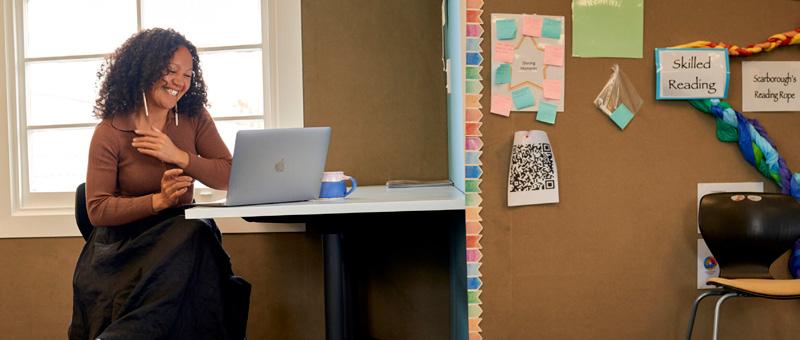
The academic study component is delivered online, and led by skilled academic staff members. Through a range of learning opportunities, including readings, videos and interactive activities, ākonga are able to develop a strong understanding of both the theory and practice of teaching. Learners will connect what they experience during their school based learning, with their online academic study.
The academic study component is delivered online, and led by skilled academic staff members. Through a range of learning opportunities, including readings, videos and interactive activities, ākonga are able to develop a strong understanding of both the theory and practice of teaching. Learners will connect what they experience during their school based learning, with their online academic study.

Ākonga will complete 8-week practicum placements, as is typical in most ITE programmes, so they can apply their theoretical knowledge in a real classroom setting.
Ākonga will complete 8-week practicum placements, as is typical in most ITE programmes, so they can apply their theoretical knowledge in a real classroom setting.
An additional field experience, school-based learning, is also completed. This means ākonga spend two days per week in their partner school throughout their study. A mentor teacher is appointed within the partner school, whose role is to facilitate learning experiences for the ākonga across the school. Schools receive a payment for mentor teachers.
An additional field experience, school-based learning, is also completed. This means ākonga spend two days per week in their partner school throughout their study. A mentor teacher is appointed within the partner school, whose role is to facilitate learning experiences for the ākonga across the school. Schools receive a payment for mentor teachers.
Enrolments in these programmes are open now.
Enrolments in these programmes are open now.
If schools have kaimahi or volunteers who are considering teacher training and would like to know more about the Open Polytechnic | Te Pūkenga programmes, please contact Vanessa Madhar, Partnership Coordinator: regionalpc@openpolytechnic.ac.nz
If schools have kaimahi or volunteers who are considering teacher training and would like to know more about the Open Polytechnic | Te Pūkenga programmes, please contact Vanessa Madhar, Partnership Coordinator: regionalpc@openpolytechnic.ac.nz



Initial Teacher Education Programme Overview
www.openpolytechnic.ac.nz
Graduate Diploma in Teaching (Primary Education)
Graduate Diploma in Teaching (Secondary Education)
Bachelor of Teaching (Primary Education)
Graduate Diploma in Teaching (Secondary Technology Education)
Graduate Diploma in Teaching (Primary Education) Graduate Diploma in Teaching (Secondary Education) Bachelor of Teaching (Primary Education) Graduate Diploma in Teaching (Secondary Technology Education) Initial Teacher Education Programme Overview
www.openpolytechnic.ac.nz
Identifying asbestos
By Timmi Aplin-Barrett
Many New Zealand schools still contain asbestos and asbestos containing materials.
With over 2,000 schools in the Ministry of Education’s portfolio, they’re committed to the management of asbestos and have staff available to provide technical support and advice.
Ministry of Education leader (Hautū)
Infrastructure and Digital, Scott Evans, says while they don’t have a national view on how many schools contain asbestos, buildings constructed or renovated prior to 1 January, 2000 are likely to contain the material.
“The use of building materials containing asbestos was widespread in New Zealand and overseas until the late 1990s because of its insulation characteristics, tensile strength, chemical resistance, acoustic protection and low cost,” Scott says.

“Given the age of the school buildings across the country, asbestos or asbestos containing materials might be present in many schools.”
Asbestos can be dangerous when inhaled which is why it needs to be removed if it’s found in a building. Scott says that when asbestos is left in place and is in good condition, it doesn’t pose a significant health and safety risk.
“However, if it (asbestos) is disturbed during refurbishment, demolition, excavation or due to deterioration, there is a risk of asbestos fibres becoming airborne and causing potential health problems for anyone who may inhale the fibres,” Scott says.
“The danger for schools is when the asbestos has not been identified and the


risk has not been assessed to allow appropriate management.
“It is important to have a clear understanding of where asbestos might be present to allow the appropriate controls to be put in place. These controls might include actions as simple as restricting access to an area through to a full removal of the material.”
Asbestos could be found in vinyl floor tiles, roof sheeting, ceiling tiles or in textured ceilings, door and window mouldings, cladding, insulation and boiler sheds. Scott says the best way to know if there is asbestos in a school building is to employ a qualified asbestos surveyor to assess the building.
“This is particularly important if you are about to undertake construction work at your school, as asbestos is often found during
Asbestos consulting Asbestos surveys Asbestos clearances Mould and indoor air quality assessments FREEPHONE 0800 1 HAZMAT Operations Manager: John Olivecrona 022 036 9921 john@directhazmat.co.nz Agri Business Centre8 Weld Street, Feilding www.directhazmat.co.nz Servicing the Central and Lower North Island Property | Asbestos
“Before starting any construction work, your contractor must see your Asbestos Management Plan. If your building is assumed to have asbestos, the contractor needs to undertake a further demolition or refurbishment survey.”
refurbishment or demolition of existing buildings.
“Before starting any construction work, your contractor must see your Asbestos Management Plan. If your building is assumed to have asbestos, the contractor needs to undertake a further demolition or refurbishment survey,” he explains.
An Asbestos Management Plan will set our how the identified asbestos or ACM will be managed.

Scott says schools will need to engage an asbestos surveyor or competent person who
has a good working and formal knowledge of asbestos management to make sure it’s done properly and in accordance with the WorkSafe guidance.
“Asbestos removal must be carried out by a licenced asbestos removal contractor,” Scott says.



“They must hold the appropriate licence for the asbestos task being undertaken and prepare and deliver an asbestos removal control plan.
“In addition to the removal contractor there is a requirement for asbestos work to be signed
off by an independent licenced asbestos assessor who will oversee the process from the initial setup through to final sign off.”
School boards and principals must ensure that all asbestos in schools is identified and if so, any risks arising from the asbestos are managed to eliminate or minimise exposure. The Ministry has developed an asbestos management

process to ensure asbestos is managed in schools both on a day-to-day basis and during construction projects.
These processes include having and managing an asbestos management plan, have a contractor sign in process and much more.
For more information, visit: www. education.govt.nz and www. worksafe.govt.nz/asbestos.
BETTA SCHOOL SERVICES: • Building Inspections • Condition Assessments • Asbestos Surveying • Asbestos Testing • Playground Inspections • Healthy Homes • End of Tenancy Call 0800 422 388 today! www.bettagroup.co.nz New Zealand’s Inspection Company Largest Property Property | Asbestos
“In addition to the removal contractor there is a requirement for asbestos work to be signed off by an independent licenced asbestos assessor who will oversee the process from the initial setup through to final sign off.”
Trimming tips
By Timmi Aplin-Barrett
Maintaining trees and other plants around school property is a vital part of ensuring the safety of students and staff.
According to the Ministry of Education, trees need to be regularly trimmed. “If they get too big, the become costly to maintain and difficult to remove,” the MOE says.
“Large trees can also be a hazard in high winds and can block light and affect neighbours.”
It says trees can also be a health and safety hazard around a swimming pool.
“Remove trees close to the swimming pool to prevent leaves and branches falling in and contaminating the water, and prevent people trying to jump from the tree into the pool.”
However, some trees are protected and the local council or Heritage New Zealand should be contacted regarding this.
According to the Department of Conservation (DOC), around 1015 percent of the total land area of New Zealand is covered with native flora.
“Eighty percent of our trees, ferns and flowering plants are endemic,” DOC says. This means many trees in New Zealand are protected and could be on school property.
Trees, such as Pohutukawa, totara and kauri are part of this rule and, therefore, people ought to take care when dealing with the maintenance or removal of such trees.
Local councils will be able to advise on this.
The MOE says schools may also need resource consent for activities around protected trees such as excavating or digging,
depositing material close to the tree, construction work, putting in pipes or power lines or storing things under the tree.
The Property Maintenance Grant (PMG) can assist with costs around maintaining trees and such on school property.
It’s a grant provided by the ministry as part of operational funding. The fund is paid into the school’s bank account in quarterly instalments, along with operational funding.
The MOE says maintenance applicable for the grant includes general maintenance and painting for school buildings, ground maintenance and swimming pool maintenance.
MOE states that the PMG covers general maintenance work on trees such as trimming and removing dead branches and the removal of a protected tree, providing council consent has been sought.
Experts in tree maintenance are generally recommended and can offer further advice and information.

Companies with professional arborists ensure any tree maintenance is done safely, to a high quality and within the rules MOE, councils and Heritage New Zealand have in place.
For more information, visit: www.education.govt.nz or www.doc.govt.nz.

80 | Term 3, 2023 Property | Landscaping Servicing Aucklands schools for over 45
Tree risk assessment • Consultancy • Report writing • Tree Removal • Tree Pruning Hedge Trimming • Stump Grinding • Branch Chipping • FREE Mulch Service for Schools Phone: 09 570 9674 Email: hello@treefellas.co.nz www.treefellas.co.nz SINCE 1976
years
Concrete industry experts
JCB Contracting is your local concrete contracting company for the Canterbury region. They are Canterbury’s first call for all your concrete needs.
“We offer concrete placing and finishing services, house foundations, shed floor slabs, concrete preparation and boxing service, as well as driveways, patios and paths,” say the team.
If you need a new driveway or are planning on putting down the foundations for your new home build, JCB Contracting can give you industry professional and quality guidance for all your concrete needs.
Whether it is concrete, boxing, driveways or general inquiries, the team is ready to help you. The team have many years’ experience working with

concrete and will ensure you are happy with your final result. They will make sure to give you the best experience with their contractors, ensuring the project task is completed in a timely manner. The team pride themselves on being experts in the concrete industry, with all the latest up to date information and equipment provided.


The team understand it can be hard to know where to start with finding the right person for your new project. JCB Contracting ensure they only use the highest quality equipment and concrete, meaning leaving any task to the team will be a breeze.
If your garden pathway needs an update or maybe you want to complete the driveway from stones to concrete, JCB Contracting are the perfect company to help you with all your needs.
Make sure to get in touch with JCB Contracting for a free no obligation quote today and the
Make
team hope to hear from you soon to help you with anything in regards to concrete.
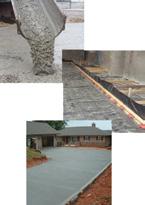
JCB Contracting 027 849 7133
www.jbccontracting.co.nz
We are Canterbury’s first call for concrete services!
We offer concrete placing and finishing services, house foundations, shed floor slabs, concrete preparation and boxing services, as well as driveways, patios, and paths!

Your Dream
FOR A STRONGER FOUNDATION JCB CONTRACTING
Come True!
“We offer concrete placing and finishing services, house foundations, shed floor slabs, concrete preparation and boxing service, as well as driveways, patios and paths.”


Taking water safety seriously
By Michaela Pointon
Repaint with EPOTEC NT EPOXY
Made in New Zealand for over 30 years. EPOTEC pool paint has been formulated specifically for use in swimming pools and has a proven record in schools, domestic, large council and international theme park pools throughout Asia, Australia, and New Zealand.
Water Safety New Zealand says, “As an island nation in the south pacific, enjoying the water is deeply engrained in our DNA.
“Our ocean, coasts, beaches, lakes and rivers define us and reflect the people we have become. Water is life and in New Zealand, it’s our way of life.”
Through leadership, advocacy and education, Water Safety New Zealand works hard with individuals and the public to reduce drowning and water injury accidents in Aotearoa.
“Experiences in, or around the water are part of what we do and what makes us Kiwi. But sadly, drownings and non-fatal drowning accidents are all too common.”
Swimming instructor, Ester Hone-Moore, has more than 25 years of experience teaching swimming lessons and water safety to teachers.
“As a sector, we know we must learn how to float, and then work towards swimming distance. Water safety is more than just swimming strokes, it’s about learning how to recognise the dangers and gaining the skills to survive,” she says.
She suggests for teachers one of the main aspects to teaching water safety is having a layered voice approach with classroom lessons about the importance of staying safe in the water.
She says this can help students retain the information, as well as also covering the water safety code in depth.
Let us help you with your school pool:
• Advise on preparation and repair
• Supply of the most appropriate paint system
• Latest Epoxy and Acrylic technologies to suit your needs
School pool maintenance can be a big use of resource so make sure it is done once and done correctly.



Call our technical experts on 09 837 0897 x 3 or find your local EPOTEC Approved Applicator at



Water Safety New Zealand has a mission that by 2025 more people in New Zealand will have a better understanding on the importance of respecting water. This goal also includes having the skills, knowledge and awareness to enjoy our water spaces safely.
Introducing children to water environments from when they are babies is important. Water Safety New Zealand says that it’s exceptionally important for babies, infants and children to be nurtured around water by the people they trust.
The Ministry of Education (MOE) states that learning to swim is part of The New Zealand Curriculum.

“All children will have had opportunities to learn basic aquatic skills by the end of Year 6’. Students will have access to learning about water safety and developing aquatic skills.”
All schools and kura receive Ministry of Education funding to run their school and deliver the curriculum.
The MOE says the funding can be used to manage a school swimming pool or instead support ākonga with access to lessons at a nearby third-party facility.
“Emphasis should be placed on really learning the water safety code about being prepared, watching out for yourself and others, being aware of the dangers and knowing your limits.”
There are many ways to create crosscurricular opportunities to incorporate water safety in the classroom.
For example, discussing the ecology of a river, how riptides naturally occur or current event impacts on the environment such as climate change, can help students understand the bigger picture of water safety.
The New Zealand curriculum notes that parents and whānau also play an important role in keeping children and young people safe beyond school.
Despite there being a good effort from MOE and Water Safety New Zealand about implying safe and correct water practices, families also need to contribute to their child/s education surrounding water environments.
Water safety skills are invaluable and will support children for the rest of their lives.
To find out more about the importance of water safety in schools, as well as resources and further support, visit: education.govt.nz.
When it comes to swimming pool paint, only time will tell!
BEFORE AFTER
www.cotec.co.nz Working Space | Water Safety
Even though winter is upon us, it’s no excuse to relax when it comes to taking water safety seriously.
We are a water nation – let our children enjoy our country to its fullest!
We are incredibly lucky to live in a country with stunning coastlines, some of the most beautiful lakes and rivers in the world and multitudes of public, school and home pools.
Water and swimming are in our DNA and it’s essential that we equip ourselves and our families with the life skill of swimming and water safety.
Learning to swim is not something that happens overnight. It’s a process. And repetition is key. Practicing the same skills repeatedly is important – it’s just like riding a bike, one day the skill you are practising will click and you’ll be off. We offer a free trial swimming lesson to all new customers, so that they can come along and meet us, get a vibe for how our swim schools work and we can ensure that swimmers are placed into the correct class for their skill level.
We are a New Zealand owned family business in our 50th year of teaching #lessonsforlife and are absolutely passionate about making sure all kiwis are competent and confident swimmers. It’s not just about getting to the end of the pool, it’s about having the strength and technique to get there… and then keep going. Strength and technique will help to ensure there is water safety for everyone.
We have four locations in Auckland, two in Hamilton and one each in Havelock North and Palmerston North.
We provide many schools with swimming lessons either at their own pool or our locations.
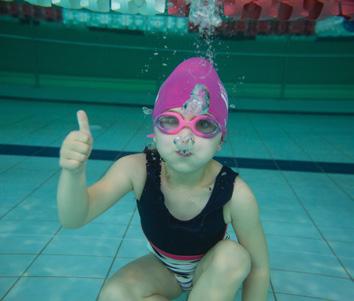

We offer lessons for infants from three months of age right through to adults who want to attend classes to learn to swim and perfect their technique.

For more information visit hiltonbrownswimming.co.nz
Our friendly Hilton Brown Swimming team look forward to hearing from you!

SWIM WITH CONFIDENCE
LESSONS FOR 3 MONTHS THROUGH TO ADULTS





AUCKLAND | HAMILTON HAVELOCK NORTH | PALMERSTON NORTH
FREE TRIAL LESSON FOR ALL NEW CUSTOMERS
www.hiltonbrownswimming.co.nz
Ready
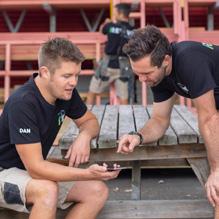


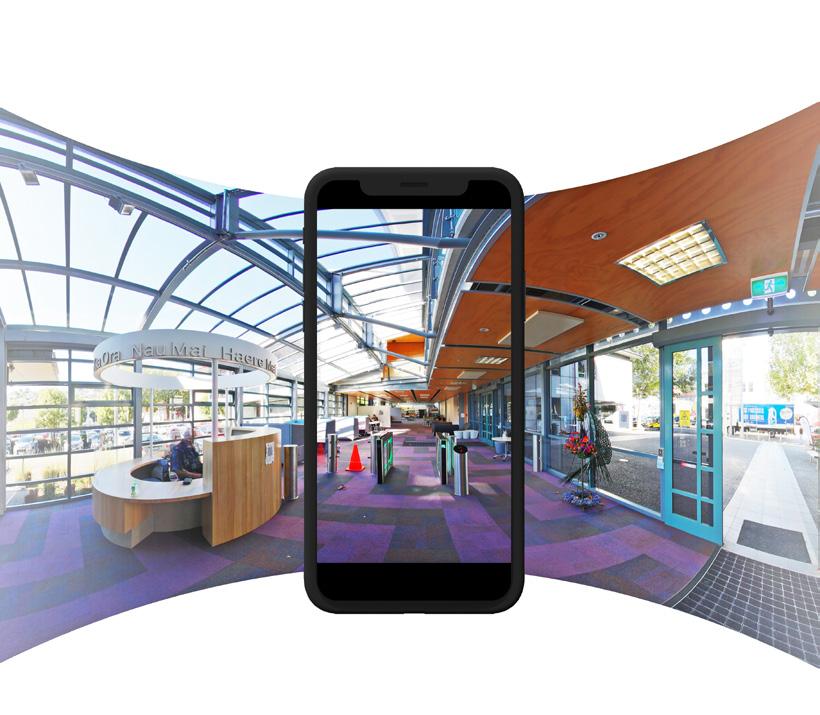
88 | Term 3, 2023 Tutorial Tutorial Workshop Video
tour of
campuses
Take a virtual
our
to find out
UCOL
Pūkenga
the
are?
what it’s like to study at
Te
from
comfort of your living room, classroom, or wherever you
Find out more here: www.ucol.ac.nz/tours/virtual-campus-tour
Our innovative virtual tour lets you explore our campus with 360-degree videos and photos from every corner. Now you can experience UCOL Te Pūkenga from wherever you are.





























































 By June Pfister
By June Pfister























































































 By Timmi Aplin-Barrett
By Timmi Aplin-Barrett

































































































































 By Natasha Parrant
By Natasha Parrant













































